|
December 21, 2019 - No. 32
Matters
of Serious Concern for Canadians
Canada's
Integration into the U.S. Imperialist War Economy
- K.C.
Adams -

For
Your Information
• Production
and Sale of War Materiel
• Global War Economy
• Sun Never Sets on Canadian Military
- Yves Engler -
United States
• Impeachment,
Accountability and the Battle of Democracy
• Rights Organizations Fight to End
Detentions, Deportations and Militarization of the U.S.-Mexico Border
• Social
Conditions Deteriorate in the United States
- Voice of
Revolution -
Developments in Latin America and the Caribbean
• Fifteen
Years in Defence of Unity, Peace and Integration
- Declaration
of the XVII Summit of ALBA-TCP
Heads of State and Government -
• Our America in the Face of the Onslaught
of
Imperialism and the Oligarchies
- Cuban
Ministry of Foreign Affairs -
• 30th
Anniversary of U.S. Invasion of Panama
- Carlos
Pérez Morales -
Bolivia
• Resounding
Defeat of the U.S. in the Organization of American States After
Adoption of Caribbean Resolution
- Cubadebate -
Venezuela
• Bolivarian Government Rejects U.S. Law
to
Deepen Aggression Against the Venezuelan People
- Statement of
the Government of the
Bolivarian Republic of Venezuela -
• New U.S. Law Sharpens Unilateral
Coercive Measures
-
Misión Verdad -
• Supreme
Court Justice Rejects Self-Declared President's
Attempt to Install a "Virtual Congress"
Colombia
• More than 200,000 Unidentified Bodies
Found in Secret Graves
Matters of Serious Concern
for Canadians
- K.C. Adams -
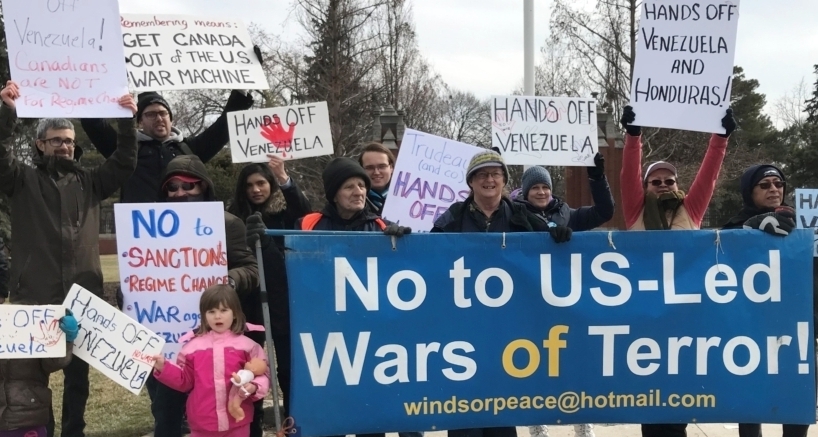
Canada's integration into the U.S. imperialist
war economy is a serious matter of concern for Canadians. The U.S. war
economy has tentacles into every U.S. state as well as Canada and
countless other places abroad. The war economy encompasses production
and sales of military goods and services to military customers
domestically and internationally and all the fixed and circulating
value it requires to operate such as buildings and fuel. The war
economy includes thousands of military bases, airports, colleges,
research centres, intelligence agencies, testing facilities and a vast
army of active duty and reservist military personnel and services to
veterans.
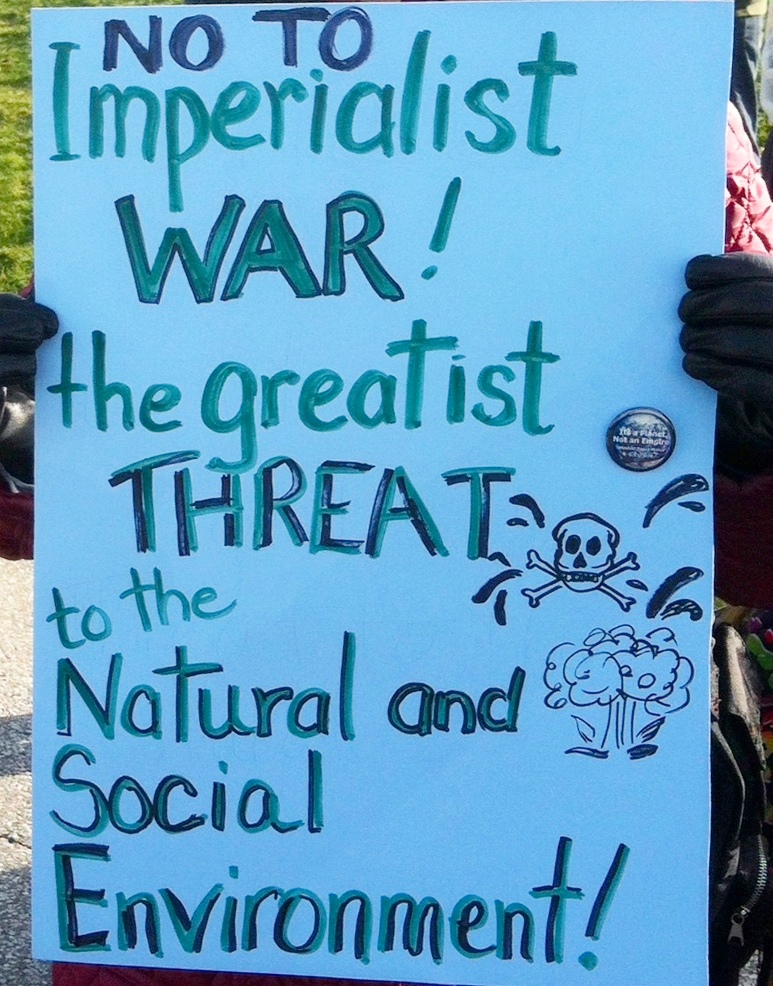 As policing has
become more militarized under Homeland Security and other factors,
police forces have emerged as important consumers of war materiel. A
significant aspect of the war economy is propaganda generated in the
general culture to promote the imperialist military and its
contribution to life and the pushing of state-organized violence to
defend the property and interests of the financial oligarchs and their
striving for global hegemony in opposition to the peoples of the world. As policing has
become more militarized under Homeland Security and other factors,
police forces have emerged as important consumers of war materiel. A
significant aspect of the war economy is propaganda generated in the
general culture to promote the imperialist military and its
contribution to life and the pushing of state-organized violence to
defend the property and interests of the financial oligarchs and their
striving for global hegemony in opposition to the peoples of the world.
The U.S. war economy exists within a relation with
the aim of the U.S.-centred financial oligarchy for worldwide hegemony.
U.S. imperialist theft of social wealth from the peoples of the world
and its competition with other big powers feed the war economy and in
turn generate increased instability, violence and war.
The war economy would shrink considerably if U.S.
overseas' bases were closed and troops returned home. Such a
transformation is favoured by the insistence of the people within the
U.S., Canada and worldwide to demand a new direction for the economy to
meet the needs of the people and develop trade on the basis of mutual
benefit. This requires breaking the relation between the domestic
economy and the striving of the financial oligarchy for global hegemony
through active military intervention abroad against competitors or
those who refuse to submit, the instigation of war and threats of war,
regime change and the organizing of military Special Operations to
capture markets, sources of raw material, places to invest and working
people to exploit.
A new aim for the economy is necessary that
replaces the current anti-social aim where a small class of rich
oligarchs conspire and compete to expropriate maximum profit from the
social wealth that working people produce at home and abroad.
A new pro-social aim for the economy would be in
conformity with the modern socialized productive forces and have
fidelity to the ensemble of human relations and what they reveal.
Working people produce social wealth collectively. By vesting
themselves with decision-making power, they will prohibit the
exploitation of those who produce the social wealth, affirm the rights
of all, humanize the social and natural environment and ensure the
country is a zone for peace.
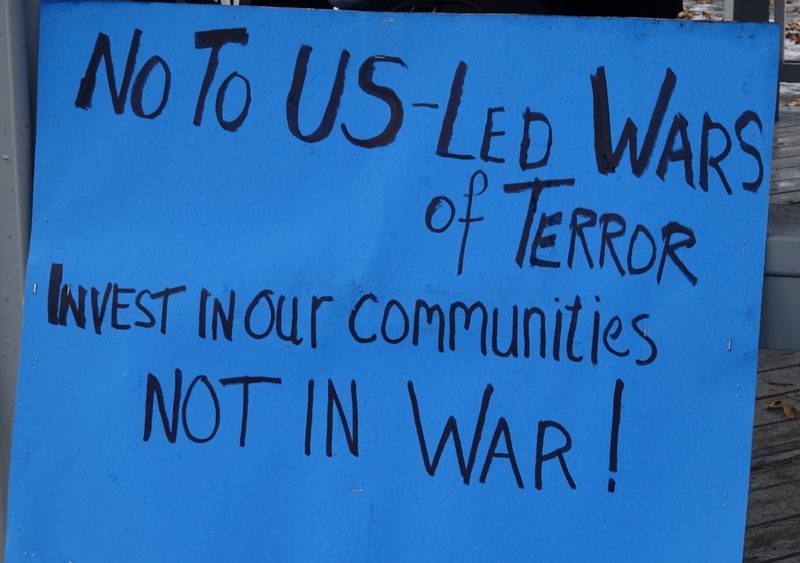 To prevail over
the war economy and the financial oligarchy that profits from it means
that in 2020 the peoples everywhere will continue to mobilize
themselves to fulfill the aims they set for the economy and the
country. By organizing themselves politically to change the direction
of the economy and the political and social conditions in ways that
favour them and not the rich oligarchs, headway is forthcoming. To prevail over
the war economy and the financial oligarchy that profits from it means
that in 2020 the peoples everywhere will continue to mobilize
themselves to fulfill the aims they set for the economy and the
country. By organizing themselves politically to change the direction
of the economy and the political and social conditions in ways that
favour them and not the rich oligarchs, headway is forthcoming.
The transition away from a war economy would not
be as difficult as some suggest. The war economy essentially consumes
already produced social wealth in exchange for war materiel and the
human factor necessary to wage war. Imperialist war and its war
materiel are instruments of destruction and oppression and do not
contribute to the well-being of the people and Mother Earth. Much of
the social wealth used in exchange to pay for the war economy comes
from taxation, as governments are the main organizer and paymaster.
With a pro-social aim and new direction for the economy, other uses can
be found for that social wealth and the human productive force released
from the war economy. Needless to say, the suggestions to humanize the
social and natural environment are unlimited in their scope.
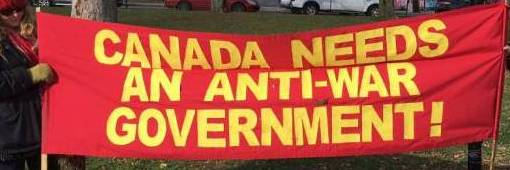

For
Your Information
The U.S. and other governments generally contract
for the purchase of war materiel from private companies. This means
political control is fundamentally important for those who profit from
the production of war materiel and services. A recent example of the
importance of political control is Amazon losing a $10 billion Pentagon
"cloud" contract to its competitor Microsoft. Amazon immediately
launched a legal challenge to the decision and directly attacked the
Trump administration accusing it of interference in the awarding of the
contract. The antagonism between President Trump and Amazon and in
particular its CEO Jeff Bezos, the owner and publisher of the Washington
Post is intense.[1]
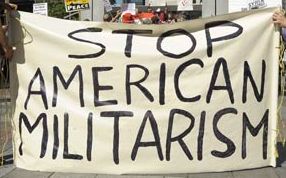 Many of the
largest companies involved in the war economy use the guaranteed state
military contracts as a base to build their sales in non-military goods
and services. An example is Boeing, the second-largest arms producer in
the world. It registered $29.2 billion in arms sales at home and abroad
in 2018, which acted as a 29 per cent anchor or platform for its total
realized gross income from sales of $101.1 billion. Many of the
largest companies involved in the war economy use the guaranteed state
military contracts as a base to build their sales in non-military goods
and services. An example is Boeing, the second-largest arms producer in
the world. It registered $29.2 billion in arms sales at home and abroad
in 2018, which acted as a 29 per cent anchor or platform for its total
realized gross income from sales of $101.1 billion.
The Stockholm International Peace Research
Institute (SIPRI) annually compiles data on global military sales,
excluding China. The data for 2018 show 43 companies based in the U.S.
had a total gross income of $246 billion from the sale of military
goods and services at home and abroad. This represents a 7.2 per cent
increase in sales compared with 2017 and accounts for 59 per cent of
the total gross income from arms sales of the largest 100 companies
worldwide. The data does not include the research, production and sales
at government owned military enterprises or "in-house" maintenance of
military assets.
Regarding the significance of arms sales in
relation to total military spending, SIPRI writes, "In general,
spending on weapons, weapons systems and platforms, and other
specifically military equipment (including the research and development
for such equipment) forms no more than a third of military spending,
and much less in non-arms producing countries. In the USA, procurement
and research and development have usually accounted for about 30 per
cent of total 'National Defense' outlays since 2005."
The five biggest arms producers in the world are
based in the United States and alone accounted for $148 billion in
gross income and 35 percent of the total arms sales of the top 100
companies in 2018. They are:
Lockheed Martin Corp. $47.26 billion in
military gross income: Lockheed Martin, the largest arms
producer in the world saw its arms sales grow 5.2 per cent in 2018,
which amounted to 11 per cent of the gross income of the top 100
companies worldwide. Lockheed Martin produces the F-35 combat aircraft
purchased by many countries within the U.S.-led imperialist system of
states.
Boeing $29.15 billion: The arms
sales of Boeing, the second-largest arms producer in the world, grew
5.7 per cent in 2018 and totalled 6.9 per cent of global sales of the
100 biggest companies.
Northrop Grumman Corp. $26.19 billion:
Northrop Grumman's arms sales grew by 14 per cent in 2018, an increase
of $3.3 billion. This was driven in part by its acquisition of arms
producer Orbital-ATK and strong domestic and international demand for
its weapons, including intercontinental ballistic missiles and missile
defence systems.[2]
Arms sales by Raytheon
at $23.44 billion (ranked fourth) rose by 3.9 per cent.
Arms sales at General
Dynamics Corp climbed 10 per cent to $22 billion (ranked
fifth).
Notes
1. The
newspaper Business Insider headlined on December 9,
"Amazon recently lost out to Microsoft on a $10 billion cloud-computing
contract for the Department of Defense.
"Amazon has challenged the decision on the Joint
Enterprise Defense Infrastructure contract, alleging in court that
President Donald Trump's bias against Amazon played a role in the
decision.
"In documents made public Monday, Amazon said
Trump led ‘repeated public and behind-the-scenes attacks' to
ensure Amazon didn't get the contract in order to harm CEO Jeff Bezos,
‘his perceived political enemy.'
"Trump has not hidden his dislike of Amazon: He's
accused the company of 'getting away with murder on tax' and accused
Bezos of using the publication he owns, the Washington Post,
as a 'lobbyist weapon.'"
2. A
development in the U.S. arms industry in 2018 was the growing trend in
consolidations among some of the largest arms producers. For example,
two of the top five, Northrop Grumman and General Dynamics, made
multibillion-dollar acquisitions in 2018. SIPRI writes, "'U.S.
companies are preparing for the new arms modernization programme that
was announced in 2017 by President Trump,' says Aude Fleurant, Director
of SIPRI's Arms and Military Expenditure Programme. 'Large U.S.
companies are merging to be able to produce the new generation of
weapon systems and therefore be in a better position to win contracts
from the U.S. Government.'
"The summary of the U.S. 2018 National Defense
Strategy published by the administration of President Donald J. Trump
stated that the current security environment was characterized by
‘Inter-state strategic competition' and that the U.S.
military advantage had atrophied and needed to be rebuilt in order to
address the strategic competition from China and Russia. This document
emphasized the USA's commitment to continue with and strengthen its
large-scale arms modernization programme announced in 2017. Following
this announcement, several U.S. arms companies included in the Top 100
merged or acquired other companies' business segments in 2017 and 2018,
partly with the aim of gaining an advantage over their competitors. The
larger deals included Northrop Grumman's acquisition of Orbital-ATK,
United Technologies' acquisition of Rockwell Collins, and General
Dynamics' acquisition of CSRA. There were also transactions of a
smaller scale such as CACI International's acquisition of a business
unit of General Dynamics, and Engility's acquisition of the information
technology (IT) segment of SAIC."
"The main motivation for the consolidations in
2017 and 2018 was the USA's comprehensive and ambitious arms
modernization programme aimed at designing and producing a new
generation of weapon systems."
3. In addition to details on the 100 largest
arms-producing and military services companies: "SIPRI has information
on total military expenditure for each country with a specific category
for spending on arms. Military expenditure is defined as spending on
the military in general, including spending on personnel (i.e. the
salaries and benefits of troops and civilian staff), operations and
maintenance (i.e. spending on general supplies, services and
transport), equipment (e.g. arms, other military equipment and
non-military equipment), construction (e.g. of military bases) and
research and development."
For the full report from SIPRI for 2018, click
here.

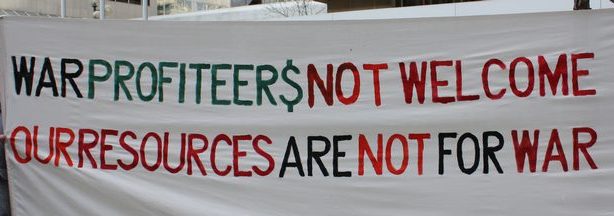
The global gross income from arms sales of the
100 largest arms-producing and military services companies in the world
excluding China was $420 billion in 2018, an increase of 4.6 per cent
compared with 2017. This annual total using a constant 2018 dollar was
47 per cent higher than in 2002. The growth from 2017 to 2018 occurred
mainly in sales by the top five U.S. companies, which the
Stockholm International Peace Research Institute (SIPRI) says, "can be
correlated to increases in global military expenditure, particularly
the rise in U.S. spending from 2017 to 2018."
Seventy companies based in the USA and Europe
accounted for 83 per cent of total Top 100 arms sales. At $348 billion
in 2018, their combined arms sales were 5.2 per cent higher than in
2017 with most of the growth in U.S. companies. Arms sales of companies
based in Europe in the Top 100 totalled $102 billion in 2018 with some
of that production in the United States. For example, the arms sales of
the USA-based subsidiary of BAE Systems were approximately $10 billion
in 2018, equivalent to a 48 per cent share of BAE Systems' total arms
sales of $21.2 billion.
Ten companies in Russia were listed in the Top 100
with combined gross income of $36.2 billion. SIPRI reports that while
this figure remained largely unchanged from 2017, their share of total
Top 100 arms sales dropped from 9.7 per cent to 8.6 per cent in 2018
because of "the substantial growth in the combined arms sales of U.S.
and European companies."
Russia's largest arms producer, Almaz-Antey, was
the only Russian company ranked in the top 10 (at 9th position) and
accounted for 27 per cent of the total arms sales of Russian companies
in the Top 100. Almaz-Antey's arms sales rose by 18 per cent in 2018,
to $9.6 billion "due not only to strong domestic demand, but also to
continued growth in sales to other countries, particularly of the S-400
air defence system," writes SIPRI researcher Alexandra Kuimova.
Twenty Top 100 companies are found outside the
U.S., Europe and Russia with six based in Japan, three each in Israel,
India and the Republic of Korea (south Korea), two in Turkey and one
each in Singapore, Australia and Canada (CAE Inc. at 87th position with
$1.01 billion in arms sales, a one year growth of 19 per cent).
The six Japanese companies had a combined gross
income from the sale of arms of $9.9 billion accounting for 2.4 per
cent of the Top 100 total.
The three Israeli companies' arms sales of $8.7
billion accounted for 2.1 per cent of the Top 100 total.
The combined arms sales of the three Indian arms
companies listed in the Top 100 were $5.9 billion in 2018.
The three companies based in south Korea had
combined arms sales of $5.2 billion in 2018, equivalent to 1.2 per cent
of the Top 100 total.
Arms sales by the two Turkish companies listed in
the Top 100 increased by 22 per cent in 2018, to $2.8 billion. SIPRI
writes, "Turkey aims to develop and modernize its arms industry and
Turkish companies continued to benefit from these efforts in 2018."

- Yves Engler -
Most Canadians would be surprised to learn that
the sun never sets on the military their taxes pay for.
This country is not formally at war yet more than
2,100 Canadian troops are sprinkled across the globe. According to the
Armed Forces, these soldiers are involved in 28 international missions.
 There are 850 Canadian troops
in Iraq and its environs. Two hundred highly skilled special forces
have provided training and combat support to Kurdish forces often
accused of ethnic cleansing areas of Iraq they captured. A tactical
helicopter detachment, intelligence officers and a combat hospital, as
well as 200 Canadians at a base in Kuwait, support the special forces
in Iraq. There are 850 Canadian troops
in Iraq and its environs. Two hundred highly skilled special forces
have provided training and combat support to Kurdish forces often
accused of ethnic cleansing areas of Iraq they captured. A tactical
helicopter detachment, intelligence officers and a combat hospital, as
well as 200 Canadians at a base in Kuwait, support the special forces
in Iraq.
Alongside the special forces mission, Canada
commands the NATO mission in Iraq. Canadian Brigadier General Jennifer
Carrigan commands nearly 600 NATO troops, including 250 Canadians.
A comparable number of troops are stationed on
Russia's borders. About 600 Canadians are part of a Canadian-led NATO
mission in Latvia while 200 troops are part of a training effort in the
Ukraine. Seventy-five Canadian Air Force personnel are currently in
Romania.
Some of the smaller operations are also highly
political. Through Operation Proteus a dozen troops contribute to the
Office of the United States Security Coordinator, which is supporting a
security apparatus to protect the Palestinian Authority from popular
disgust over its compliance in the face of ongoing Israeli settlement
building.
Through Operation Foundation 15 troops are
contributing to a U.S. counter-terrorism effort in the Middle East,
North Africa and Southwest Asia. As part of Operation Foundation,
Brigadier-General A. R. Day, for instance, directs the Combined
Aerospace Operations Center at the U.S. military's Al Udeid base in
Qatar.
The 2,100 number offered up by the military
doesn't count the hundreds, maybe a thousand, naval personnel
patrolling hot spots across the globe. Recently one or two Canadian
naval vessels -- with about 200 personnel each -- has patrolled in East
Asia. The ships are helping the U.S.-led campaign to isolate north
Korea and enforce UN sanctions. These Canadian vessels have also been
involved in belligerent "freedom of navigation" exercises through
international waters that Beijing claims in the South China Sea, Strait
of Taiwan and East China Sea.
A Canadian vessel is also patrolling in the
Persian Gulf/Arabian Sea. Recently Canadian vessels have also entered
the Black Sea, which borders Russia. And Canadian vessels regularly
deploy to the Caribbean.
Nor does the 2,100 number count the colonels
supported by sergeants and sometimes a second officer who are defence
attachés based in 30 diplomatic posts around the world (with
cross-accreditation to neighbouring countries). Another 150 Canadian
military personnel are stationed at the North American Aerospace
Defense Command headquarters in Colorado and a smaller number at
NORAD's hub near Tampa Bay, Florida. These bases assist U.S. airstrikes
in a number of places.
Dozens of Canadian soldiers are also stationed at
NATO headquarters in Brussels. They assist that organization in its
international deployments.
There may be other deployments not listed here.
Dozens of Canadian soldiers are on exchange programs with the U.S. and
other militaries and some of them may be part of deployments abroad.
Additionally, Canadian Special forces can be deployed without public
announcement, which has taken place on numerous occasions.
The scope of the military's international
footprint is hard to square with the idea of a force defending Canada.
That's why military types promote the importance of "forward defence".
The government's 2017 "Strong, Secure, Engaged: Canada's Defence
Policy" claims Canada has to "actively address threats abroad for
stability at home" and that "defending Canada and Canadian interests
... requires active engagement abroad."
That logic, of course, can be used to justify
participating in endless U.S.-led military endeavors. That is the real
reason the sun never sets on the Canadian military.

United States
On December 18, the House of Representatives,
where the Democratic Party representatives form a majority, voted to
impeach President Donald Trump by passing two motions: one charges
Trump with abuse of power and the other with obstruction of Congress.
Under Senate rules, a Senate impeachment trial starts the day after the
House provides it with the articles of impeachment, unless that day is
a Sunday. To start the process the Senate must first vote on rules for
its own impeachment trial and what witnesses will be invited/permitted.
Republicans hold a 53-47 majority in the Senate, and 67 votes are
required to convict a president.
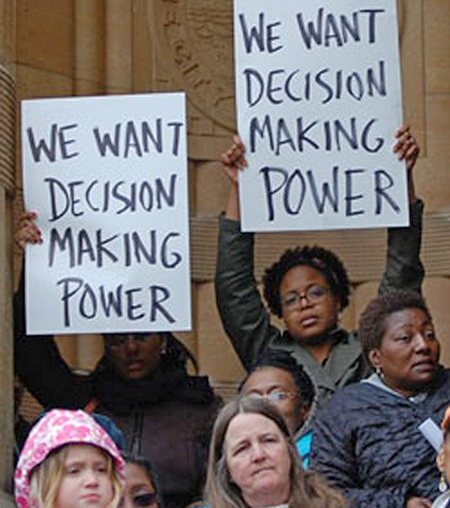 However, after
voting to impeach the president, House Democrats took a decision to
delay transmitting the articles of impeachment to the Senate. Speaker
of the House of Representatives Nancy Pelosi cited concerns that the
Republicans in control of the Senate would not hold a "fair trial." In
other words, the Democrats do not agree with the rules the Republicans
are seeking to set for the Senate trial nor the witnesses proposed, if
any. This is the first time the impeachment of a president takes place
at a time both houses of Congress are not under the command of the same
party. It is not clear whether the horse trading taking place will get
either party the votes it wants in this matter. Given how the vying
factions among the rulers and their representatives are currently
lining up, few think the impeachment of the president will succeed.
Meanwhile, both Houses are scheduled to take a two-week break for the
holidays. However, after
voting to impeach the president, House Democrats took a decision to
delay transmitting the articles of impeachment to the Senate. Speaker
of the House of Representatives Nancy Pelosi cited concerns that the
Republicans in control of the Senate would not hold a "fair trial." In
other words, the Democrats do not agree with the rules the Republicans
are seeking to set for the Senate trial nor the witnesses proposed, if
any. This is the first time the impeachment of a president takes place
at a time both houses of Congress are not under the command of the same
party. It is not clear whether the horse trading taking place will get
either party the votes it wants in this matter. Given how the vying
factions among the rulers and their representatives are currently
lining up, few think the impeachment of the president will succeed.
Meanwhile, both Houses are scheduled to take a two-week break for the
holidays.
What is nonetheless clear from the on-going
spectacle in the House of Representatives is that impeachment does not
in fact hold the president accountable for his actions and the entire
thing serves to deprive the American people of a vantage point which
favours their striving for empowerment.
Pelosi has emphasized that "The president must be
held accountable, and no one is above the law." Impeachment is
presented as a mechanism for accountability, and more generally the
effort is supposed to send the message to the public that the "system
works" when it comes to this problem. They do not need to fight for new
arrangements.
In fact the current arrangements are not sorting
out the fighting between the factions of the ruling class. The civil
war scenario between the ruling factions in the U.S., as well as the
very limited articles of impeachment being presented -- for abuse of
power, but only concerning the Ukraine/Biden affair, and obstruction of
justice -- create doubt that impeachment will hold President Trump
accountable.
This is clearly true for the crimes of greatest
concern to the people, completely absent from the articles of
impeachment even though there is far more evidence. These include the
crimes of family separation and detention camps of children, even
babies. They include the war crimes, such as those against Yemen, Iraq
and Afghanistan, through use of drones and chemical weapons and more.
They include collective punishment of whole populations using
sanctions, such as against Venezuela, Cuba, the Democratic People's
Republic of Korea, Iran and many others.
Voice of Revolution, newspaper
of the U.S. Marxist-Leninist Organization, notes that people across the
country, joined by many abroad have persisted in waging battles for
rights and demanding change on these matters.[1] It writes:
"Impeachment provides no accountability for
government refusal to do so. The many actions included thousands more
worldwide actions to defend Mother Earth, November 29, and continuing
weekly demonstrations across the country in many places; continuing
united actions both sides of the southern border defending migrants as
well as the recent not guilty verdict of an activist who aided two
young migrants crossing the desert in Arizona; anti-war actions,
including those against NATO in London, New York City and elsewhere;
strikes by teachers taking social responsibility for problems like
homelessness and lack of counselors and nurses in their schools; and
many more.
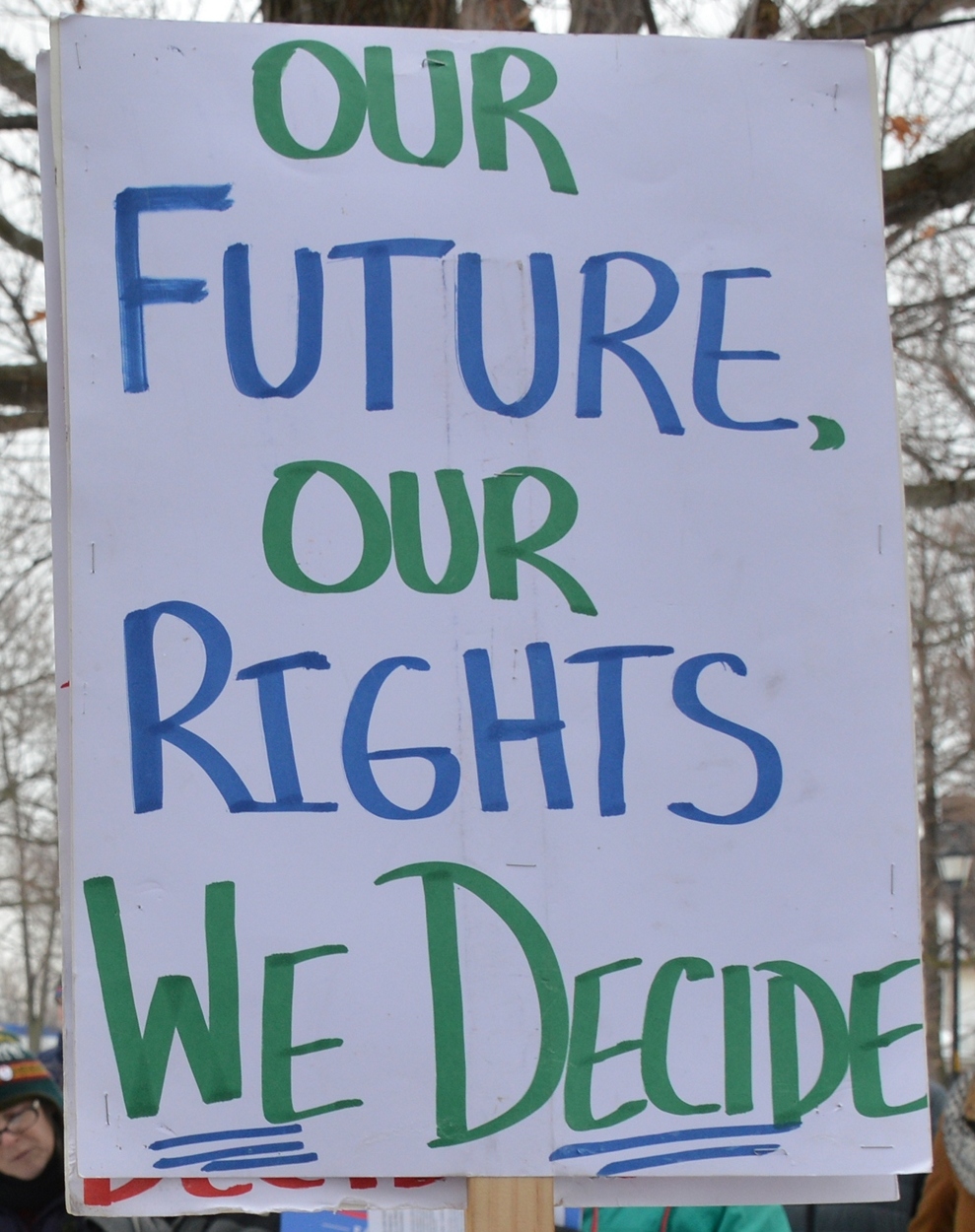 "These battles
for democracy contribute to the efforts all across the country to give
voice to the demands of the people and to affirm their rights. They
also raise the central issue of today's battle of democracy, of who
decides, the minority or the majority? The battle of democracy is the
battle to advance the content and form of democracy and the
institutions for it so as to bring it on a par with modern times.
Empowering the people, the majority to govern and decide, is required.
That is the democracy that would put in place the means to have the
anti-war, pro-social will of the people -- readily apparent in the many
united actions, meetings, petitions, strikes -- implemented. This is
precisely what the rulers are striving to prevent. Impeachment is part
of this effort to embroil everyone for and against while attempting to
divert the drive of the people to themselves be decision-makers. "These battles
for democracy contribute to the efforts all across the country to give
voice to the demands of the people and to affirm their rights. They
also raise the central issue of today's battle of democracy, of who
decides, the minority or the majority? The battle of democracy is the
battle to advance the content and form of democracy and the
institutions for it so as to bring it on a par with modern times.
Empowering the people, the majority to govern and decide, is required.
That is the democracy that would put in place the means to have the
anti-war, pro-social will of the people -- readily apparent in the many
united actions, meetings, petitions, strikes -- implemented. This is
precisely what the rulers are striving to prevent. Impeachment is part
of this effort to embroil everyone for and against while attempting to
divert the drive of the people to themselves be decision-makers.
"U.S.-style democracy ensures a small minority
rules over the majority, a problem impeachment does not solve. Nor does
it solve the problem of accountability. The Constitution and existing
law provide no mechanism for the people to hold the president
accountable for crimes. The Justice Department has long said it is
unconstitutional to charge a sitting president and has not done so. Nor
can a citizen's arrest be made of a sitting president, given that any
such effort would be blocked by the Secret Service and the citizen
charged.
"The need to have a mechanism in the hands of the
people to hold the president accountable for crimes brings to the fore
this need to advance the battle of democracy -- the battle for new
institutions of governance, a new constitution that does provide for
accountability. People very much despise the ability of government,
especially the president, to commit crimes with impunity. Even
elections, given as the way to deal with this issue, do not provide a
means to bring criminal charges. Indeed, like impeachment, they are yet
another mechanism where the people do not decide the outcome; the
rulers, the minority do.
"The battle of democracy is the battle of
political power, the battle for new arrangements that empower the
people to govern and decide. A new constitution and institutions should
serve to harmonize the many human relations of the present, the whole
ensemble of relations between humans and humans and humans and nature.
Harmonizing and providing for accountability are interrelated, so this
issue too must be addressed. Steps in this direction today include
stepping up organized efforts for the people, as individuals and
collectives, to speak out in their own name, voice their concerns,
stick to their own agenda for the change needed. It includes discussing
and debating this problem of accountability, what is needed for it and
how achieving it is related to advancing the battle of the people to
govern and decide."
Note
1. Voice
of Revolution, December 13, 2019.

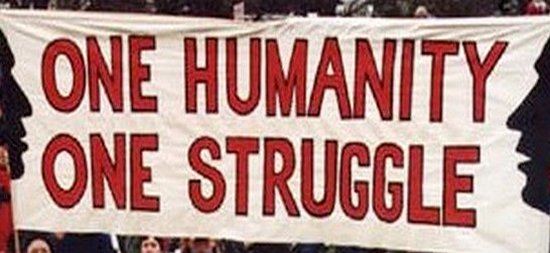 Through a
variety of means, immigration rights organizations are speaking out and
taking their stands against detentions, deportations and the
militarization of the border, which still includes thousands of troops
on the border. Efforts include demonstrations, proposals to
"re-envision" the approach to immigration and provide legislation that
recognizes rights, legal and humanitarian aid on the ground, such as
providing food and water to those forced to cross the desert, court
cases and more. Through a
variety of means, immigration rights organizations are speaking out and
taking their stands against detentions, deportations and the
militarization of the border, which still includes thousands of troops
on the border. Efforts include demonstrations, proposals to
"re-envision" the approach to immigration and provide legislation that
recognizes rights, legal and humanitarian aid on the ground, such as
providing food and water to those forced to cross the desert, court
cases and more.
Demands include an immediate moratorium on
deportations and detentions and their elimination. The call is to
"centre the rights of working people," at home and abroad, recognizing
immigration as a global issue where the U.S. greatly contributes to the
violence and devastation imposed on peoples here and abroad. There is
recognition that the detentions and many of the deportations, actions
also carried out under Bush and Obama, are crimes. The government
continues to act with impunity and no one is held accountable for the
deaths, violence and family separations daily occurring.
People in cities across the country have
repeatedly stood against family separation and detention, especially of
children. Many are saying "This is not my America" and joining in the
struggles for rights and a new direction for the country, one that is
pro-social and pro-humanity.
Contrary to this demand of the public, detention
camps continue to expand, an indication that they are not only for
immigrants and refugees, but potentially for those organizing, who the
government targets as "threats." Or, as has already happened, are
charged with human smuggling simply for providing aid to undocumented
immigrants. That is, not only is the government not held accountable
for crimes, but those organizing for rights are being criminalized. The
increasing militarization of the border and detention camps at military
facilities is a further indication that far from solving any problems,
the government is further criminalizing resistance, which includes
providing humanitarian aid.
The various organizations standing up for the
rights of all at home and abroad are contributing to a path forward
that defends the interests of the peoples. It is this spirit and stand
that no one is illegal, we are one humanity with one struggle for our
rights, that will further strengthen the work being organized.

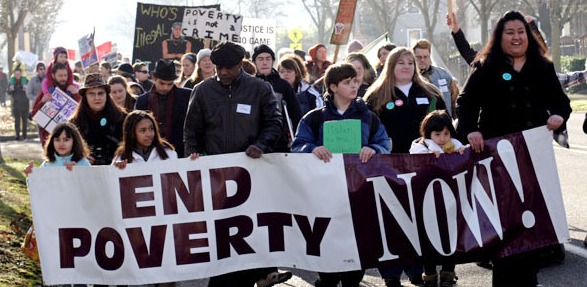
The necessity for the
independent politics of the working class and an
anti-war pro-social direction for the economy
In a series of articles, the mass media have
presented lurid exposures of inhumane living conditions in the United
States. Social conditions for many in cities in California, the
Northwest, New York and elsewhere are shown to have become untenable.
Thousands of people in city after city live outside on sidewalks and
parks with little access to sanitation and other public services. The
housing situation for workers in Silicon Valley is said to be so
desperate that the Apple Corporation has decided to invest $2.5 billion
to build rental housing for its workers and others on land it owns in
San Francisco.
The New
York Times has detailed serious social problems in health
care, education, and housing and the corrupting influence of big money
in the cartel party system of the Democratic and Republican Parties.
The items suggest inequality of social wealth between the rich and poor
is the root problem and not a symptom of a deeper issue, and that
redistribution of accumulated wealth is necessary if social problems
are to be solved.
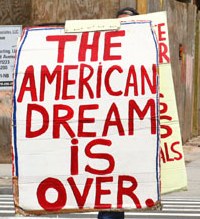 Other articles
refute this approach and declare the "American Dream" to become rich
and to "fend for yourself" have made the nation dominant in world
affairs, while state redistribution of wealth is contrary to the
"American way." The dispute is often presented as a conflict of
outlooks and policy objectives between the two established cartel
parties and within the Democratic Party itself. Other articles
refute this approach and declare the "American Dream" to become rich
and to "fend for yourself" have made the nation dominant in world
affairs, while state redistribution of wealth is contrary to the
"American way." The dispute is often presented as a conflict of
outlooks and policy objectives between the two established cartel
parties and within the Democratic Party itself.
The articles on inequality of wealth, amongst
other sources, rely on recent research from economists Emmanuel Saez
and Gabriel Zucman,found in their book, The Triumph of
Injustice: How the Rich Dodge Taxes and How to Make Them Pay.
They argue the concentration of wealth in a few hands has become so
great as to be untenable, resulting in unresolved social problems that
only increased taxes on the rich can resolve.
The data reveals that 400 rich U.S. households
currently own more social wealth than the entire population of those of
African descent, around 48 million, plus a quarter of those of Latin
American and Hispanic descent, another 14 million people. The richest
top 0.1 per cent has seen its grasp of U.S. social wealth nearly triple
from seven per cent to 20 per cent between the late 1970s and 2016,
while the bottom 90 per cent has seen its share of wealth decline from
35 per cent to 25 per cent in that same period.
The richest 130,000 families in the U.S. now hold
nearly as much social wealth as the bottom 117 million families
combined. The top one per cent own 42 per cent of the country's entire
social wealth. The articles do not break this down as to what
constitutes wealth other than general references to stocks, bonds,
ownership of companies and property, houses, cars, disposable income
etc.
From this mass of accumulated wealth and
investments, ownership of property and companies and from positions as
executives and directors, the richest individuals constituting one per
cent of the total population realize annual incomes amounting to 20 per
cent of the total reported income in the United States. In contrast,
the reported income for the vast majority of working people comes not
from investments and ownership of property but from selling their
capacity to work to those who own and control the socialized economy.
According to the tax research of Saez and Zucman,
the families in the top 0.1 per cent are projected to owe 3.2 per cent
of their total wealth and income in federal, state, and local taxes for
the year 2019, while the bottom 99 per cent are projected to owe 7.2
per cent of their accumulated wealth and income.
The data and subsequent analysis concentrate on
the possession and distribution of social wealth in money form. From
this, the analysis arrives at the conclusion that increased taxes on
the rich will solve the problems facing the people. But is a lack of
money the cause of the dreadful social conditions and problems?
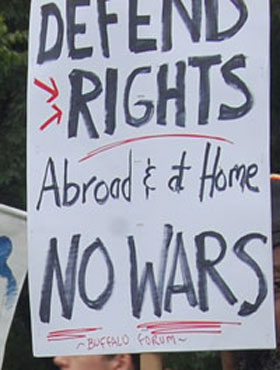 Saez and Zucman
point to a period in U.S. history from the beginning of WWII into the
1970s when the rich paid much higher taxes and their share of wealth
was one-third relative to what they control of the total today.
However, the situation during the earlier period did not result in the
realization of the right of all to health care, education, housing,
proper sanitation, and security in retirement and when injured, sick or
disabled. The increased funds in government hands relative to the total
social wealth during and after World War II led to militarization of
the U.S. economy. The U.S. ruling elite did not use the increased funds
to guarantee the rights of the people with extensive social programs
and free public services but to establish thousands of military bases
within the U.S. and around the world, wage continuous wars under the
imperialist banner of "containment of communism," and build its war
arsenal of modern weaponry, including naval armadas, warplanes, tanks,
artillery, assault rifles and vast numbers of nuclear bombs and
missiles. Saez and Zucman
point to a period in U.S. history from the beginning of WWII into the
1970s when the rich paid much higher taxes and their share of wealth
was one-third relative to what they control of the total today.
However, the situation during the earlier period did not result in the
realization of the right of all to health care, education, housing,
proper sanitation, and security in retirement and when injured, sick or
disabled. The increased funds in government hands relative to the total
social wealth during and after World War II led to militarization of
the U.S. economy. The U.S. ruling elite did not use the increased funds
to guarantee the rights of the people with extensive social programs
and free public services but to establish thousands of military bases
within the U.S. and around the world, wage continuous wars under the
imperialist banner of "containment of communism," and build its war
arsenal of modern weaponry, including naval armadas, warplanes, tanks,
artillery, assault rifles and vast numbers of nuclear bombs and
missiles.
The U.S. state does not have a lack of money. It
has an annual war budget of around a trillion dollars plus billions
more for "homeland security," countless internal and external spy and
police agencies, money for "diplomatic" interference in the sovereign
affairs of others, pay-the-rich schemes for big business, and money to
pay for pro-war imperialist propaganda, armed mercenaries and prisons
to incarcerate over two million of its own people.
The research and series of articles in the mass
media leading to the conclusion of a lack of money to solve problems
ignore the outmoded relations of production between the working class
and financial oligarchy and the contradiction between a socialized
economy and its control by competing private interests, which are the
root of the problem of inequality and powerlessness of the working
people to deal with the conditions they face. Those who do the work and
sell their capacity to work to the rich have no economic or political
control over the economy and have access only to that portion of the
new value they produce paid to them in wages and whatever social
programs that may exist in exchange for their capacity to work.
The rich who own and control the productive
forces, the direction of the economy and the cartel party political
system of the Democratic and Republican Parties expropriate added-value
from the new value workers produce. Taxation has become a broad method
of the financial oligarchy to take back from working people what they
have been paid in exchange for their capacity to work. The ruling elite
of competing factions of the financial oligarchy and their political
representatives have control over how that value is distributed and
used. The prevailing relations of production dictate the control of the
ruling imperialists over the economy and its direction. The politics of
the cartel party system of the Democratic and Republican parties
reflect the control and domination of competing factions of the ruling
elite.
Most social programs such as education and health
care result in increased value of the capacity to work of the working
class. The companies that consume this value should pay for it not
through taxes but by directly paying the institutions that produce the
value. To increase individual and social reproduced-value demands
action to bring into being increased investments in social programs and
free public services, higher wages, pensions and benefits for workers,
an end to paying the rich, and a new anti-war pro-social direction of
the economy.
The U.S. working class is faced with a class
struggle to organize itself as a viable social force capable of
defending its rights, forcing the rich to increase the reproduced-value
working people receive in exchange for their capacity to work, and
through its own independent politics open a path forward to democratic
renewal and a new direction for the economy.
An independent political program and
nation-building project of the working class and its allies to empower
themselves through democratic renewal include increased investments in
social programs and free public services to guarantee the rights of
all, and actions to stop paying the rich and to dismantle the war
economy and give it a new pro-social direction. This can be
accomplished through the development of the organized independent
politics of the working class and its own thinking, outlook and agenda
in opposition to the politics, outlook and agenda of the rich and their
cartel party political system of competing factions of the financial
oligarchy.
The working class and its allies must develop
their own independent politics, media, voice and democratic
personality. They cannot rely on the rich and their political
representatives within the cartel party system and mass media to act or
speak on their behalf, solve the social problems facing the country,
chart a new anti-war pro-social direction for the economy and country,
and open a path forward to the emancipation of the working class.

Developments in Latin
America and the Caribbean
- Declaration of the XVII
Summit of ALBA-TCP Heads of State and Government -

1. The Heads of State and Government and the
Heads of Delegations of the member countries and invited guests of the
Bolivarian Alliance for the Peoples of Our America-Peoples' Trade
Treaty (ALBA-TCP), met in Havana on December 14, 2019 to commemorate
the 15th Anniversary of the Alliance, founded by Commanders Fidel
Castro Ruz and Hugo Rafael Chávez Frías, with a
firm commitment to strengthen it, as an expression of the aspirations
for regional independence and a bulwark of genuine Latin American and
Caribbean integration in the face of growing threats to regional
self-determination, sovereignty, peace and stability.[1]
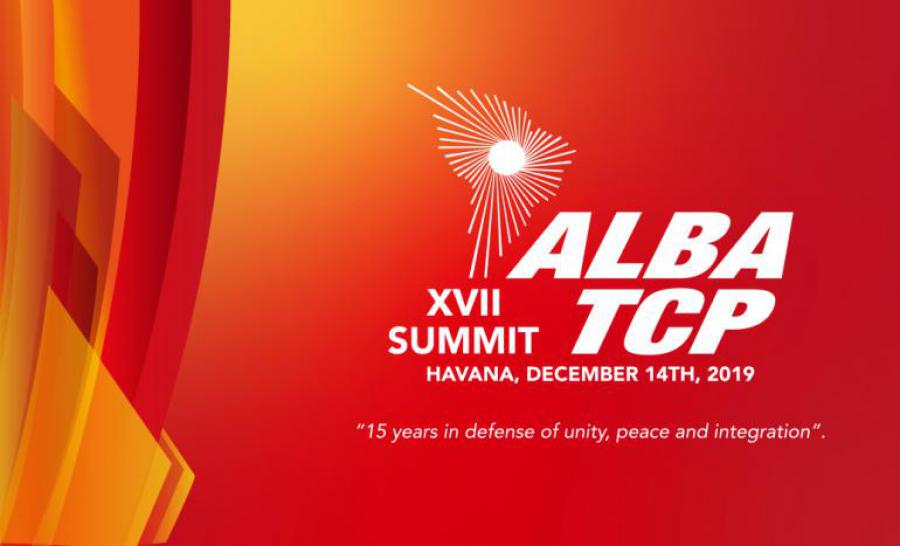 2. We defend the
ideas of Bolívar, Martí, San Martín,
Sucre, O' Higgins, Petión, Morazán, Sandino,
Maurice Bishop, Garvey, Túpac Katari, Bartolina Sisa,
Chatoyer and other heroes of Latin American and Caribbean independence. 2. We defend the
ideas of Bolívar, Martí, San Martín,
Sucre, O' Higgins, Petión, Morazán, Sandino,
Maurice Bishop, Garvey, Túpac Katari, Bartolina Sisa,
Chatoyer and other heroes of Latin American and Caribbean independence.
3. We emphasize that regional unity and
integration are the only way to confront the domination exercised by
hegemonic structures of world power, which have left our peoples in a
historical condition of political, economic and cultural subordination
and vulnerability.
4. We express that ALBA-TCP is the first genuine
Latin American and Caribbean integration front, based on principles of
solidarity, social justice, defense of independence and sovereignty,
self-determination of peoples, economic cooperation and
complementarity, a fruit of the deep integrationist vocation of its
members and of its political will to advance together towards
sustainable development, in order to satisfy the needs of our countries
and people.
5. We highlight the social achievements of
ALBA-TCP, which have been aimed at human beings, regardless of race,
socioeconomic background, creed or political position, allowing
millions of Latin American and Caribbean People to benefit from the
social policies promoted by the Alliance.
6. We especially stress the Literacy Program, the
Milagro Mission, the Care Program for Persons with Disabilities, the
Latin American Children's Cardiology Hospital, the training of
comprehensive doctors at the Latin American School of Medicine-ELAM in
Cuba and Venezuela and PetroCaribe, as well as the Casas del ALBA, the
ALBA Sports Games, teleSUR and Radio del Sur.
7. We point out the progress made by ALBA-TCP in
the economic and financial sphere, especially after 11 years since the
establishment of the Banco del ALBA, during which time various
infrastructure, production and service projects have been developed in
the different countries of the region.
8. We ratify our commitment to the construction of
an alternative model of economic sovereignty, expressed in a New
Financial Architecture, in order to consolidate a system of exchange
and reciprocal, supportive, participatory and complementary cooperation
that strengthens our economic and commercial freedom.
9. We reaffirm our willingness to continue working
and cooperating in confronting climate change, a phenomenon that is a
product of the capitalist system, with its irrational patterns of
production and consumption, which attack our Mother Earth and increase
the frequency and intensity of natural phenomena that cause regrettable
human and material losses.
10. We emphasize the participation and full
presence of social movements, solidarity movements and popular sectors
in our integration process, in order to advance in the construction of
inclusive, culturally diverse and environmentally responsible societies
that exclude the exploitation of human beings.
11. We condemn the aggressive and interventionist
policy of the United States government, which, with the complicity of
national oligarchies and the corporate media, combined with the
consequences of the harsh application of inhumane neo-liberal models,
are the fundamental causes of dangerous regional instability.
12. We reaffirm that the current policy of the
United States Government towards Our America poses challenges that
generate clear violations of the principles enshrined in the Charter of
the United Nations and International Law, as well as the postulates of
the Proclamation of Latin America and the Caribbean as a Zone of Peace.
13. We reject the threats of the use of force by
the United States Government against the Bolivarian Republic of
Venezuela and the maintenance and expansion of criminal unilateral
coercive measures against its people, which continue to be the main
threat to peace in Latin America and the Caribbean. We support the
Bolivarian Revolution, the Venezuelan People's Civic-Military Union and
the Constitutional President of the Bolivarian Republic of Venezuela.
14. We reject the activation of the Inter-American
Treaty of Reciprocal Assistance (TIAR) against the Bolivarian Republic
of Venezuela that represents a danger to peace, which could facilitate
the fabrication of a pretext and establish the bases for a possible
military intervention against the Bolivarian people.
15. We condemn the coup d'état against
the constitutional government of comrade Evo Morales Ayma in Bolivia,
which constitutes a clear expression of the imperialist strategy of the
United States in the Western Hemisphere and its permanent intention to
violate the self-determination of our peoples according to their
hegemonic pretenses. The complicity of the Bolivian oligarchy in the
violent interruption of democratic institutions in the country, and the
indulgent support of other oligarchies in the region for this flagrant
violation of the rule of law and human rights leaves no room for doubt.
16. We emphasize that for the purpose of
recovering the spaces conquered by the peoples with progressive
governments, the United States Government, in collusion with the
oligarchies of the region, revives methods that seemed to have been
overcome in the history of Latin America and applies new formulas of
the so-called unconventional warfare.
17. We denounce that intolerance, racism and
brutal repression against social movements and native peoples have
multiplied in Bolivia, with the clear determination to revert the
achievements by its people during the presidency of comrade Evo Morales
Ayma.
18. We denounce that the threats and the repeated
destabilizing attempts against the legitimate government of the
sisterly Republic of Nicaragua are a profound violation of
International Law. The Sandinista Government of Nicaragua and its
President, Daniel Ortega Saavedra, have our solidarity and support.
19. We express our solidarity with the people of
the sisterly Commonwealth of Dominica, and congratulate Prime Minister
Roosevelt Skerrit on his re-election last December 6, with broad
popular support.
20. We reject interfering actions against the
political process in Suriname and attempts to destabilize that country.
The Constitutional Government of Suriname and its President, Desire
Bouterse, have our solidarity and support.
21. We firmly reject the application of the Monroe
Doctrine. We demand respect for the self-determination of our peoples,
sovereignty, territorial integrity and non-interference in the domestic
affairs of each State, the peaceful settlement of international
disputes, the rejection of the threat or use of force in international
relations, while denouncing the use of unconventional methods of
warfare to overthrow legitimate governments and the imposition of
unilateral coercive measures against Latin American and Caribbean
countries.
22. We state that the rise of neo-liberal
governments to political power in the region has led to a clear
reversing of social welfare policies in several countries, increasing
poverty rates, deep social inequalities and the marginalization of
broad sectors of the population.
23. We declare that the growing corruption of
neo-liberal governments, their exercise of power to maximize the
profits of transnational corporations and a tiny minority of privileged
elites, violence and police brutality, have caused the outbreak of
massive demonstrations in Our America.
24. We denounce false statements of the U.S.,
attributing to members of this Alliance the responsibility in the
organization of the massive popular protests that have spread
throughout the region, which aim to conceal that the failure of the
efforts of neo-liberal governments are due to the requirements imposed
by Washington.
25. We reject the shameful distortion of Latin
American reality by the United States and the oligarchic elites of the
region that seek to conceal the true origin of popular demonstrations.
26. We reject the self-proclaimed champions of
human rights and democracy, who increasingly resort to militarization
and repression to sustain the neo-liberal model in crisis. The numbers
of dead, wounded and mutilated speak for themselves of the
disproportionate use of force by repressive bodies. The support of
several governments for the brutal repression in several countries and
the complicit silence of others is unacceptable.
27. We condemn the systematic actions of the
United States government to discredit and sabotage the international
cooperation provided by Cuba in the area of healthcare in dozens of
countries, which has benefited millions of people, as well as the
blatant pressure exerted against several governments to interrupt the
acceptance of Cuban supportive cooperation, to the detriment of the
right to life and access to medical services for their citizens.
28. We emphasize the recent adoption by the
General Assembly of the United Nations of the resolution entitled
"Necessity of ending the economic, commercial and financial blockade
imposed by the United States of America against Cuba" by 187 votes in
favor, which once again demonstrated the overwhelming isolation of the
U.S. government, within the context of an international community
committed to truth, justice and respect for International Law. The
regrettable decision of the Brazilian government to vote against and
the Colombian government to abstain confirm the hijacking of their
policies by sectors that are openly servile to the interests of the
White House.
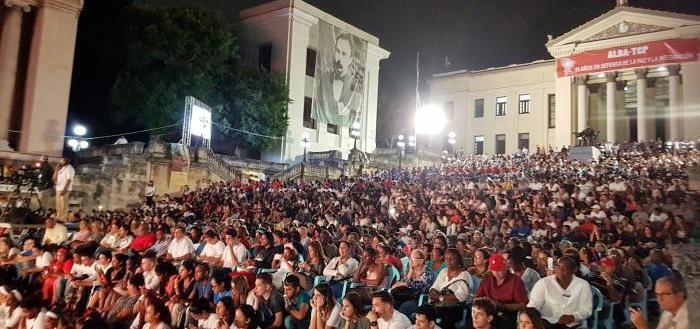
Political-cultural program in celebration of the 15th anniversary of
ALBA-TCP,
December 14, 2019 at University of Havana’s Grand Stairway.
29. We express our solidarity with the brotherly
Caribbean countries, which suffered genocide against their native
population, the horrors of slavery, the transatlantic slave trade and
colonial and neocolonial plundering; today they face the challenges
resulting from climate change, natural disasters and the unjust
financial system that endangers their small economies. We reaffirm the
right of Caribbean countries to receive fair, special and differential
treatment. The Caribbean will always find in ALBA-TCP a platform for
articulation, cooperation and complementarity to defend its just claims
and for reparations.
30. We express our desire for unity and
integration that confirms the importance of preserving the Community of
Latin American and Caribbean States (CELAC), a genuine mechanism to
promote the common interests of our nations through political agreement
with respect for diversity. In this regard, we commit ourselves to
support Mexico in its exercise of the Pro Tempore Presidency of the
Community.
31. We welcome the incorporation of Antigua and
Barbuda as a full member of the Banco del ALBA on 4 November 2019.
32. The challenges we face reaffirm the need to
close ranks in the face of external threats, interference and
aggression, with full confidence in victory. United we will confront
interventionism and the coup plotters. We are sustained by the deep
conviction that the construction of the better future for Our America
that we desire and work for, is and will increasingly be in the strong,
firm hands of the free peoples.
33. Let us ensure the realization of the rights to
life, peace, self-determination and development to which our peoples
are entitled. Let us unite! The victory of the just causes we defend
depends on our unity.
"We seek solidarity not as an end but as a means
to fulfill Our America's universal mission" -- José
Martí, Our America
Havana, December 14, 2019

Meeting of the Ottawa chapter of ALBA Social Movements, November 9,
2019, discusses the struggles of the peoples in Latin America
against imperialism and neo-liberalism.
Note
1.
Antigua and Barbuda, Cuba, Dominica, Grenada, Nicaragua, St.
Christopher and Nevis, St. Lucia, St. Vincent and the Grenadines,
Suriname, Venezuela are currently members of ALBA-TCP

- Cuban Ministry of Foreign
Affairs -
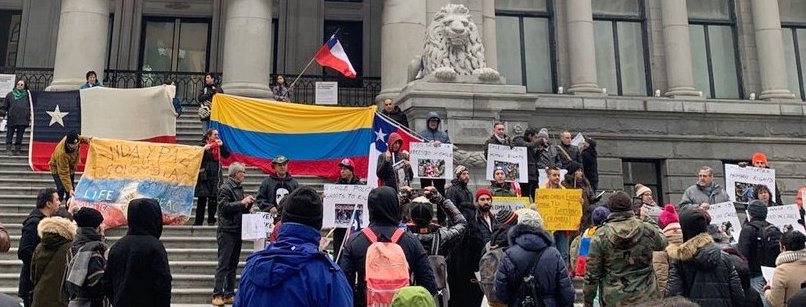
Rally at the Art Gallery in Vancouver, December 3, 2019, in support of
the struggles of the Chilean people and others in Latin America against
neo-liberalism and state repression.
The most
recent events in the region confirm that the U.S. government and the
reactionary oligarchies bear the primary responsibility for the
dangerous unrest and political and social instability that broke out in
Latin America and the Caribbean.
As was
anticipated by the First Secretary of the Communist Party of Cuba, Army
General Raúl Castro Ruz, on January 1, 2019: Those who
entertained the illusion of the restoration of imperialist domination
in our region should understand that Latin America and the Caribbean
have changed and so has the world […] The region resembles a
large prairie in times of drought. A single spark could cause
an uncontrollable fire that would damage the national interests of all."
President
Donald Trump proclaims the validity of the Monroe Doctrine and resorts
to McCarthyism to maintain the imperialist domination over the natural
resources of the region; prevent the exercise of the national
sovereignty and the aspirations of regional integration and
cooperation; attempt to re-establish his unipolar and
hemispheric hegemony; eliminate progressive, revolutionary and
alternative models to wild capitalism; revert political and social
achievements and impose neo-liberal models, with full disregard for
International Law, the rules of the game of representative democracy,
the environment or the wellbeing of peoples.
This
Monday, December 2, Secretary of State Mike Pompeo threateningly
accused Cuba and Venezuela of benefiting from and helping to stir up
unrest in the countries of the region. He distorts and
manipulates reality and conceals the main reason for the instability in
the region, which is the U.S. permanent interference in Latin America
and the Caribbean.
The
legitimate protests and peoples’ massive
demonstrations that are going on in the continent,
particularly in the Plurinational State of Bolivia, Chile, Colombia,
Ecuador and Brazil are caused by poverty and the increasingly unequal
distribution of wealth; the certainty that neo-liberal formulas are
worsening the exclusive and unsustainable situation of social
vulnerability; the absence or precarious situation of health care,
education and social security services; the abuses against human
dignity; unemployment and restriction of labor rights; privatization;
the increasing cost and cancellation of public services and the
increased public insecurity.
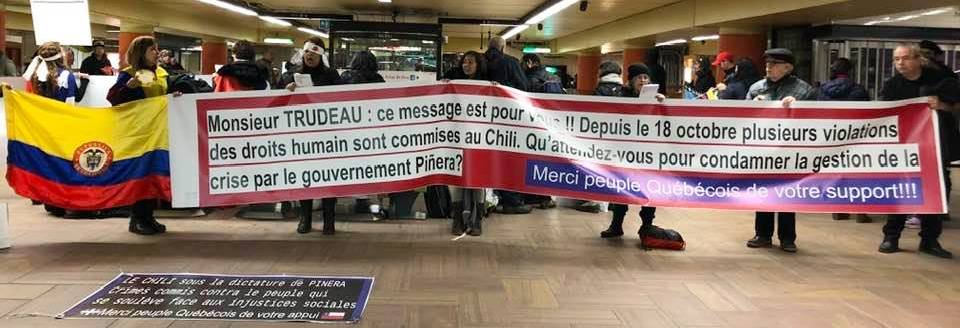

Demonstrations in Montreal, December 1, 2019 (top) and Calgary, October
26, 2019, are two of many held across the country in
support of the Chilean people's courageous fight to affirm their rights
in the face of brutal repression unleashed against them by the Chilean
state.
They
reveal the crisis of political systems, the lack of true democracy, the
discredit of traditional conservative parties, the protest against the
typical historical corruption of military dictatorships and right-wing
governments, the scarce popular support to official authorities, the
lack of confidence in institutions and the system of justice.
They also
protest against the brutal police repression, the militarization of it
using as a pretext the protection of critical infrastructures; the
exemption of repressors from criminal liability; the use of military
and anti-riot weapons that cause deaths, serious injuries, including
hundreds of youths suffering from irreversible eye injuries caused
by pellet guns; the criminalization of demonstrations;
violations, beatings and violence against detainees , among them
minors; and even the assassination of social leaders, demobilized
guerrillas and journalists.
The United
States advocates and supports repression against demonstrators under
the pretext of safeguarding the alleged "democratic order." The
complicit silence of several governments, institutions and
personalities, that turn out to be very active and critical against the
left, is a shame. The complicity of the big corporate media is shameful.
Peoples
are very rightly wondering: Where is democracy and the rule of law?
What are the institutions that are supposedly devoted to the protection
of human rights doing? Where is the justice system whose independence
is so much trumpeted?
Let’s
review some facts. In March, 2015, President Barack Obama
signed an unheard-of Executive Order declaring the Bolivarian Republic
of Venezuela as an "unusual and extraordinary threat to the national
security, the economy and foreign policy" of that big power. In
November, 2015, the costly electoral defeat of the left-wing in
Argentina occurred.
The
neo-liberal offensive had its momentum in August, 2016, with the
judicial and parliamentary coup in Brazil against President Dilma
Rousseff; the criminalization and incarceration of the leaders of the
Workers’ Party and later on of ex President Luis Inacio Lula
Da Silva himself; the prompt participation of the Department of Justice
of the United States, by virtue of the Foreign Corrupt Practices Act,
to install a dependent government, ready to revert important social
achievements through neo-liberal adjustments, introduce a nefarious
change in the development model, allow the destruction of national
businesses and a predatory privatization and sell
the resources and infrastructure of the country to American
transnationals at a cheap price.
By the end
of 2017 there was a protest against the electoral results in Honduras
that was terribly repressed.
In
January, 2018, the United States aborted the signing of an agreement
between the government of Venezuela and the Washington-controlled
opposition. One month later, the Secretary of State proclaimed the
validity of the Monroe Doctrine and called for a military coup against
the Bolivarian and Chavista Revolution.
In March,
2018, the Brazilian councilwoman Marielle Franco was atrociously
murdered. This action aroused a wave of anger in her country
and the whole world. The obscure involvement of the powers
that be in this event has not been disclosed. In April, Lula
is sent to prison through spurious judicial maneuvers. There
is abundant evidence of the U.S. interference in the Brazilian
elections through specialized companies using technologies such as "big
data" and polymetry to manipulate, on a case by case basis, the will of
voters, such as the ones used by the ultra-reactionary Steve Bannon and
others designed by Israel.
During
this period, legal proceedings were initiated against ex presidents
Cristina Fernández de Kirchner and Rafael Correa. In April,
2018, there was an attempt to destabilize Nicaragua through foreign
interference and the implementation of unilateral coercive measures.
On August
4, 2018, an attempt against the life of President Nicolas Maduro Moros
was perpetrated. In January, 2019, the self-proclamation of
the barely-known and corrupt Juan Guaidó, organized in
Washington, took place. In March, 2019, president Trump
ratified the Executive Order considering Venezuela a threat.
On April 30 there was an attempted military coup in Caracas, which
happened to be a resounding failure, and the United States, in revenge,
escalated its non-conventional war against that South American nation
that has been putting up a tenacious and heroic resistance based on the
civic and military union of its people.

Demonstration in Toronto, February 4, 2019, denounces Canada's
leadership in the Lima group and demands "Hands Off Venezuela."
During
this whole period, the U.S. government has been applying savage
anti-immigrant policies and has adopted an aggressive behavior, full of
hatred, to fuel fear and division among voters. It is
attempting to build a xenophobic wall in the border with Mexico and is
threatening this country and the entire Central America with the
imposition of terrible tariffs and sanctions if they do not stop those
who flee from poverty and insecurity. It has also increased
deportations. It cruelly separates thousands of children from
their parents; it has arrested 69 000 minors and is trying to expel the
children of immigrant parents who were born and raised in the U.S.
territory.
The ultra
right-wing government of Brazil, headed by Jair Bolsonaro, showing a
shameful subordination to the United States, has resorted to lies and a
xenophobic, racist, misogynist and homophobic discourse, combined with
delirious projections about social and political phenomena,
such as climate change, indigenous populations, the Amazon fires and
emigration, which have aroused the rejection of numerous leaders and
organizations. Under his government, the social policies that led
Brazil to dramatically reduce the levels of poverty and social
exclusion under the Workers’ Party governments are being
dismantled.
Since May,
2019, tens of thousands of demonstrators have taken to the streets to
protest against budget cuts in education, the reforms to the pension
system, the discriminatory policies and gender violence.
The
Brazilian government has interfered in the internal affairs of
neighboring countries, such as Venezuela, Argentina, Paraguay and
Uruguay and has adopted hostile positions against Cuba in violation of
International Law. As was published by the Brazilian media in
April, 2019, the foreign ministry of that country instructed 15 of its
embassies to coordinate with U.S. embassies with the purpose of
encouraging recipient governments to condemn Cuba at international fora.
For the
first time since 1992, Brazil, only joined by the United States and
Israel, voted this year against the UN General Assembly Resolution
calling for an end to the economic, commercial and financial blockade
-- that the U.S. has further tightened against Cuba -- and the
cessation of the extraterritorial implementation of U laws against
third States.
In the
same vein, the government of Colombia abstained in the vote of the
resolution it had supported since 1992 which calls for the ceasing of
the genocidal blockade imposed by the United States against Cuba
–at a moment when it is being tightened- and its
extraterritorial character. In order to justify such reprehensible
decision, the authorities of that country has resorted to the
politically motivated and ungrateful manipulation of the altruistic,
dedicated, discreet and unquestionable contribution of Cuba to peace in
Colombia, for which our country’s behavior has received
universal recognition. It is well known that this decision generated a
broad and critical debate in that nation but, despite all odds, we will
continue to accompany that nation in its efforts to achieve peace.
The U.S.
slander attributing Cuba alleged responsibilities in the organization
of popular demonstrations against neo-liberalism in South America is a
barely credible excuse to justify and tighten the blockade and the
hostile policy against our people. It is likewise useless to conceal
the failure of the capitalist system, protect teetering and repressive
governments, conceal parliamentary, judicial and police coups; and stir
up the ghost of socialism to terrify peoples. By doing this
it also intends to justify repression and the criminalization of social
protests.
Cuba’s
only responsibility is the one that emanates from the example
set by its heroic people in the defense of their sovereignty, in their
resistance against the most brutal and systematic aggressions, in the
invariable practice of solidarity and cooperation with all sister
nations of Latin America and the Caribbean.
Imperialism
is hurting because Cuba has proved that another world is certainly
possible and that it is indeed possible to build an alternative model
to neo-liberalism, based on solidarity, cooperation, dignity, a fair
distribution of wealth, equitable access to professional upgrading,
citizens’ safety and protection and the absolute freedom of
human beings.
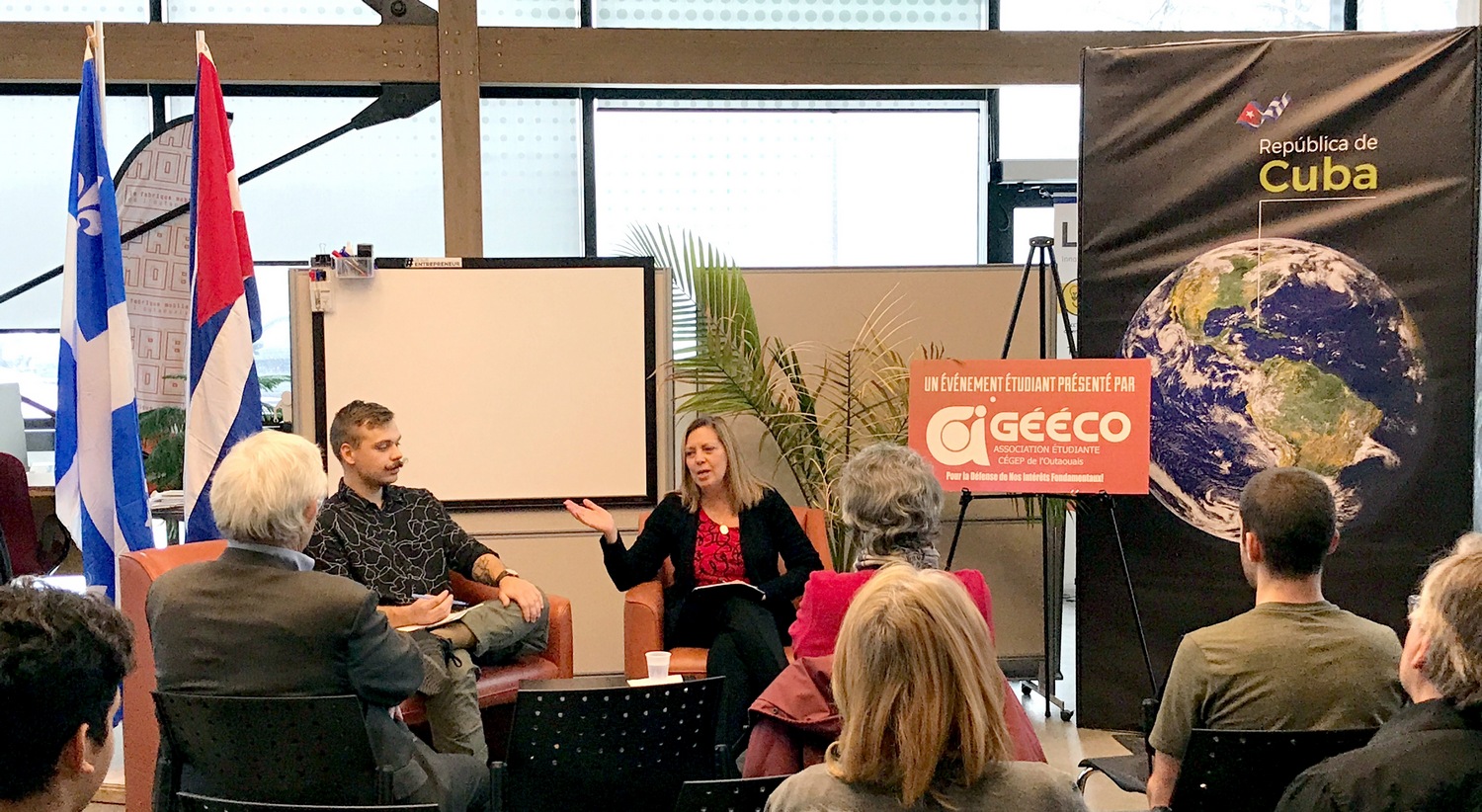
Discussion on the current situation in Cuba, December 4,
2019, with Her Excellency Josefina Vidal Ferreiro, the Republic of
Cuba's Ambassador to Canada, at the CÉGEP de l'Outaouais.
The Cuban
Revolution has also been a proof that a people that is closely united,
that has become the owner of their country and institutions, living in
a permanent and profound democracy, can successfully resist and develop
in the face of the longest-lasting aggression and
blockade in history.
The coup
d’état in Bolivia, orchestrated by the United
States, using the local oligarchy and the OAS as an
instrument, is an evidence of the aggressive character of the
imperialist onslaught. Cuba once again condemns the coup
d’état and the brutal repression that has been
unleashed in that country and expresses its solidarity with comrade Evo
Morales Ayma and the Bolivian people.
While the
U.S. government continues its non-conventional war to attempt to
overthrow the legitimate government of President Nicolás
Maduro Moros and invokes the Inter-American Treaty of Reciprocal
Assistance (TIAR), Cuba ratifies its unshakable determination to
maintain its cooperation with the government and the people of
Venezuela.
We
reiterate our solidarity with the Sandinista government and people of
Nicaragua, led by President Daniel Ortega, who is facing the U.S.
attempts of destabilization and unilateral coercive measures.
The
legitimate government of the Commonwealth o Dominica and its Prime
Minister Roosevelt Skerrit deserve international solidarity and can, as
from now, count on the solidarity of the Cuban people at a moment when
that island nation is a victim of foreign interference that is already
causing violence and is attempting to thwart the electoral process.
In this
complex scenario, the government headed by Andrés Manuel
López Obrador in Mexico is coping with neo-liberalism and
defending the principles of non-interference and respect for the
national sovereignty, while the election of Alberto
Fernández and Cristina Fernández as President and
Vice-president of Argentina evidence the unequivocal rejection of that
nation against neo-liberal formulas that impoverished and indebted that
nation and seriously harmed its people. Lula’s release from
prison is a victory of all peoples and Cuba, once again, calls for a
global mobilization to demand his complete freedom and the
reinstatement of his innocence and his political rights.
The
corruption that characterizes the behavior of the current U.S.
administration can be hidden no more. Its impact on the
peoples of Latin America and the Caribbean has taken a toll on human
lives and has caused hardships, instability and economic damages.
In view of
the tragic juncture that the region and the world are going through,
Cuba reaffirms the principles of sovereignty, non-interference in the
internal affairs of other States and the right of every people to
freely choose and create a political system of their own, in a climate
of peace, stability and justice, without threats or aggressions or
unilateral coercive measures; and encourages compliance with
the principles enshrined in the Proclamation of Latin America
and the Caribbean as a Zone of Peace.
Cuba will
continue to work towards the integration of Our America, which includes
all efforts so that the Community of Latin American and Caribbean
States (CELAC), which will be very soon presided over by Mexico, would
continue to promote the common interests of our nations by
strengthening unity amidst diversity.
In the
face of the implacable onslaught of the most reactionary forces in the
hemisphere, Cuba will oppose the unshakable resistance of its people
and its determination to defend the unity of the nation, its social
achievements, its sovereignty and independence and socialism whatever
the cost. We do it with the unswerving optimism and
confidence in victory that we inherited from the Commander in Chief of
the Cuban Revolution, Fidel Castro Ruz, under the leadership of the
First Secretary of our Party, Army General Raúl Castro and
the guidance of President Miguel Díaz-Canel.

- Carlos Pérez
Morales -
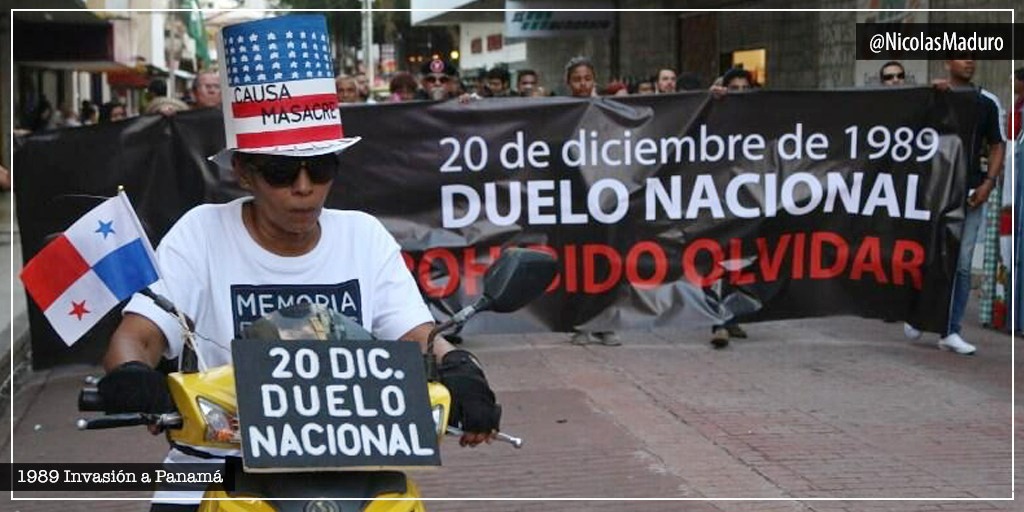
Graphic posted to Venezuelan president Maduro's twitter account in
commemoration of the 30th anniversary of the 1989
U.S. invasion of Panama.
Christmas of 1989 is keenly remembered in Panama
for the brutal military invasion by the United States. Twenty-seven
thousand U.S. soldiers, plus 12,000 more who were stationed at the 14
U.S. military bases in the former "Canal Zone" mercilessly attacked
this small Central American republic.
According to the United States, in the words of
its president George Bush, the reason for the invasion was to protect
"American" lives and overthrow the government of dictator Manuel
Antonio Noriega. We know that to overthrow the Noriega dictatorship, a
military invasion of that nature was not justified. Only a small
military command was needed to eliminate Noriega from the Panamanian
government.
Other methods could also have been used without
spilling a single drop of blood. Today we also know that the invasion,
which caused more than six thousand (6,000) Panamanian deaths, really
had other aims.
The United States wanted to regain its hegemony in
the region. Secondly, the invasion had as one of its purposes the
elimination of the Panama Defence Forces, established by General Manuel
Antonio Noriega. Thirdly, it was a rehearsal for the total war model,
without regard for the scope of the experiment. In it, new weapons were
tested such as: Stealth F-11 bombers, 2,000-pound bombs, Hellfire
missiles, Blackhawk, Apache AH-64 and Cobra helicopters and missile
launchers, A-37 assault aircraft, 30 mm rapid-fire cannons and M-16
rifles with infrared sights.
Another powerful reason is that in January 1990,
it was up to Noriega to appoint the [Panama] Canal Administrator, as
established in the Torrijos-Carter Treaties.
The attack on Panama began from Ancon Hill towards
the poor neighbourhood of El Chorrillo. This neighbourhood was burned
down by the United States military and several thousand people died,
including women and children. To this day we do not know how many
people died in that attack, since U.S. soldiers dragged many bodies
into the old "Canal Zone," where they were buried in common graves.

The merciless attack continued in other areas of
the city, where more than 400 bombs were dropped during the invasion.
The United States attacked other places that it considered of utmost
importance in the Republic of Panama. "The country went bankrupt and in
the following months there were mass layoffs of public employees and
workers of private companies." (Ecured, 2009).
The United States government swore in Guillermo
David Endara Galimany as president of Panama and Ricardo Arias
Calderón as vice president on one of its military bases in
the former Canal Zone. President Endara served as the "puppet"
president of the United States in Panama. He was always at the service
of the imperial power of the United States, following its orders. An
immediate consequence of the invasion was the reinstatement in power of
the oligarchy.
As Latin Americans, we cannot forget this act of
aggression against Panama carried out by the U.S. empire.
Carlos Pérez Morales is a
Puerto Rican historian.

Bolivia
- Cubadebate -
On December 18, the U.S. and Secretary General of
the Organization of American States (OAS) Luis Almagro suffered a
resounding defeat in the OAS, when the Caribbean Community (CARICOM)
succeeded in getting a resolution on Bolivia adopted in the Permanent
Council.
Before the meeting of the Permanent Council, the
Bolivian representative had proposed amendments to the CARICOM draft
resolution. Grenada opened the meeting by pointing out that the
Bolivian proposal did not constitute amendments to the CARICOM Project,
but a new draft Resolution.
The representative of the coup government of
Bolivia responded that he did not agree, that it was not a new
document. He thought the draft CARICOM Resolution could have been more
constructive if, instead of supporting the intention of setting the
country on fire as Evo Morales wishes, it contributed to pacifying it.
He added that many are not interested in what happened in Bolivia,
which was not actions taken against the Indigenous people, but actions
by armed groups that supported Evo Morales, as well as his call to cut
off the cities.
Belize put forward a point of order proposing that
the draft amendment proposed by Bolivia be put to a vote.
The result of the vote on the Bolivian amendment
was as follows:
In favour, 8: Bolivia, Brazil,
Colombia, USA, Ecuador, Panama, Paraguay and Venezuela.
Against, 17: Antigua and
Barbuda, Argentina, Barbados, Belize, Dominica, Guyana, Grenada,
Jamaica, Mexico, Trinidad and Tobago, Nicaragua, Saint Lucia, Saint
Vincent and the Grenadines, Suriname, Uruguay, Bahamas, Saint Kitts and
Nevis.
Abstentions, 8: Canada, Costa
Rica, Chile, Guatemala, El Salvador, Dominican Republic, Peru and
Honduras.
Absent, 1: Haiti.
The Bolivian amendment was therefore defeated.
Then the ambassador of the United States proposed
that a vote be taken on the draft CARICOM Resolution, which resulted in
the following:
In favour, 18: Antigua and
Barbuda, Argentina, Bahamas, Barbados, Belize, Dominica, Guyana,
Grenada, Jamaica, Mexico, Trinidad and Tobago, Nicaragua, Saint Lucia,
Saint Vincent and the Grenadines, Saint Kitts and Nevis, Suriname,
Uruguay and Panama.
Against, 4: Bolivia, Colombia,
USA, Venezuela (the representative of the self-proclaimed president
Guaidó).
Abstentions, 11: Canada, Costa
Rica, Guatemala, El Salvador, Dominican Republic, Ecuador, Peru,
Honduras, Brazil, Chile and Paraguay.
Absent, 1: Haiti.
As a result, the Resolution "Rejection of Violence
and Call for Full Respect for the Rights of Indigenous Peoples in the
Plurinational State of Bolivia" was approved.
An explanation of their vote by several
delegations appeared as footnotes. Among them what the Colombian
ambassador said stood out for its aggressive and even offensive
language against the sponsors of the resolution and those who supported
it. Both the representative of Colombia and of the USA attacked
Venezuela, while the representative of Guaidó also attacked
Nicaragua.
Permanent Council Resolution
"Rejection of Violence and Call For Full Respect
For the Rights of Indigenous Peoples in the Plurinational State of
Bolivia" moved by the members states of the Caribbean Community
(CARICOM):
THE PERMANENT COUNCIL OF THE ORGANIZATION OF
AMERICAN STATES,
TAKING INTO ACCOUNT the purposes and principles of
the Charter of the United Nations, and those of the Charter of the
Organization of American States (OAS);
BEARING IN MIND that international and hemispheric
conventions on Human Rights contain the values and principles of
liberty, equality and social justice that are intrinsic to democracy.
HIGHLIGHTING the United Nations Declaration on the
Rights of Indigenous Peoples, which in its Article 1 states that
"Indigenous peoples have the right to the full enjoyment, as a
collective or as individuals, of all human rights and fundamental
freedoms as recognized in the Charter of the United Nations, the
Universal Declaration of Human Rights and International Human Rights
Law"; the United Nations International Convention on the Elimination of
Racial Discrimination; and the American Declaration on the Rights of
Indigenous Peoples (AG/RES. 2888 (XLVI-O/16), which, in Article XII,
states that "Indigenous peoples have the right not to be the object of
racism, racial discrimination, xenophobia, or related intolerance.
States shall adopt the preventive and corrective measures necessary for
the full and effective protection of that right."
TAKING NOTE of the deep concerns about the human
right situation, including violence in racist and discriminatory ways,
expressed by the Inter-American Commission on Human Rights in its
preliminary observations on December 10, 2019, after its visit to
Bolivia;
ALSO NOTING the findings of the IACHR that,
following the electoral process a wave of violence occurred, and
serious allegations were made of human rights violations, including
arbitrary detentions and arrests, massacres and murder, wounding of the
civilian population, criminalization and persecution of political
opponents, violations of freedom of expression.
RECALLING the declaration, "Rights of the
Indigenous Peoples of the Americas" [AG/DEC. 79(XLIV-O/14)], which
reaffirms that progress in promoting and effectively protecting the
rights of the Indigenous peoples of the Americas is a priority for the
OAS;
RECALLING ALSO Article 9 of the Inter-American
Democratic Charter which states that "The elimination of all forms of
discrimination, especially gender, ethnic and race discrimination, as
well as diverse forms of intolerance, the promotion and protection of
human rights of Indigenous peoples and migrants, and respect for
ethnic, cultural and religious diversity in the Americas contribute to
strengthening democracy and citizen participation;"
RECOGNIZING that, notwithstanding improvements
over the last decade, the Indigenous peoples in Bolivia have suffered
from historic injustices as a result of, inter alia,
their colonization and the dispossession of their lands, territories
and resources thus preventing them from fully exercising, in
particular, their right to development in accordance with their own
needs and interests;
EMPHASIZING THAT the inherent rights of Indigenous
peoples in Bolivia, which derive from their political, economic, and
social structures and from their cultures, spiritual traditions,
histories and philosophies, especially their rights to their lands,
territories and resources, must be respected and promoted;
REAFFIRMING that Indigenous peoples, in the
exercise of their rights, should be free from discrimination of any
kind.
CONSIDERING the importance of eliminating all
forms of racial discrimination and/or violence that may emanate
therefrom that may affect citizens of the Americas including and
especially Indigenous peoples, and taking into account the
responsibility of States to combat them;
AFFIRMING that any existing doctrines, policies
and practices based on advocating superiority of peoples or individuals
on the basis of national origin or racist ideas, religious, ethnic or
cultural differences, are scientifically false, legally invalid,
morally condemnable and socially unjust;
WELCOMING the agreement signed between Bolivian
authorities and the IACHR to install an independent group of
international experts to investigate the acts of violence that occurred
between September and December 2019.
RESOLVES TO:
1. CONDEMN the human rights violations and the use
of violence against any citizen of Bolivia, especially any and all
forms of violence and intimidation against Bolivians of Indigenous
origin;
2. FURTHER CONDEMN intolerance of symbols,
traditional vestige, religious practices and unequal treatment or
mention of any element of Indigenous civilization;
3. UNDERSCORE the need for the authorities of the
Plurinational State of Bolivia to fulfil their inherent responsibility
as a part of the community of nations to protect all human rights for
everyone in Bolivia;
4. URGE the authorities of the Plurinational State
of Bolivia to respect, comply with and effectively implement all their
obligations under international law as they apply to Indigenous
peoples, particularly those related to human rights;
5. REITERATE the call made by the
Permanent Council of the OAS on November 20, 2019, in CP/RES.
1140 (2259/19) rev. 1, to all political and civil actors in Bolivia,
including all authorities, civil society, the military and security
forces, and the general public, to immediately cease from violence,
preserve peace, and seek a frank dialogue to promote national
democratic reconciliation; and
6. CALL UPON the Bolivian authorities to ensure
full and unrestricted observance and protection of human rights and to
ensure that any violators thereof are held to account, in accordance
with international human rights law as reflected in Resolution, CP/RES.
1140 (2259/19) rev. 1, of the OAS Permanent Council.

Venezuela
- Statement of the
Government of the Bolivarian Republic of Venezuela -
The Bolivarian Republic of Venezuela
categorically rejects the new interventionist aggression undertaken by
the ruling elite of the United States of America, this time by
attempting to pass legislation ironically baptized as the
Emergency Assistance, Democracy and Development Assistance for
Venezuela Act, designed to deepen the attacks against the
Venezuelan people and ignore our sovereignty and our internal
constitutional order.
Behind this chain of euphemisms, an instrument is
hidden that aims to accentuate the implementation of unilateral
coercive measures, which are illegal, while violating the Charter of
the United Nations, insofar as they undermine the human rights of more
of 30 million Venezuelans. Additionally, in a delirium of imperial
arrogance, the U.S. Congress intends, through this legislation, to
arrogate to itself the right to punish countries that maintain
commercial relations with Venezuela.
In short, this law seeks only the restoration of
neo-liberalism in Venezuela and the plundering of its resources, for
which it openly proposes an alleged regime of legal guardianship over
Venezuela, in which even its sell-out political allies in the
Venezuelan opposition would be bound by the opinions and
"recommendations" of the U.S. government.
Far from solving the problem in their country of
more than 50 million people living in conditions of poverty or
reversing the serious violation of the human rights of more than 5,000
migrant families who have been separated so far this year, the U.S.
Congress intends to waste its taxpayers' money to finance the
destabilization of Venezuela and deliver resources to its satellite
governments that are accomplices of its strategy.
In the face of this new aggression, the People and
the Government of the Bolivarian Republic of Venezuela remain firmly on
the road of legality, peace and the heroic effort to build social
justice, always ready to defend, in any scenario and in any modality,
its Constitution and its participatory and protagonist democracy from
illegal coercive measures and from acts of war and destabilization.
The dignity of the people of Bolivar will remain
intact in the face of any supremacist attack, as well as their will to
remain free, sovereign and to live in peace.

- Misión Verdad -
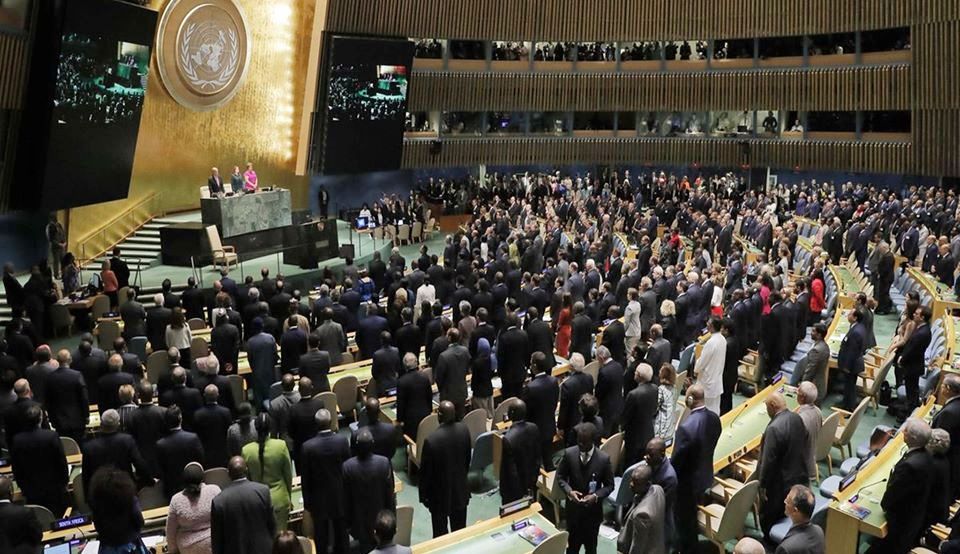
While the U.S. increases its coercive measures against Venezuela, the
United Nations accepts the credentials of the Bolivarian Government of
President Nicolás Maduro, December 18, 2019, validating it
as the only representative of Venezuela at the UN.
The Venezuela Emergency Relief bill,
Democracy Assistance and Development Act, or the VERDAD
Act, its acronym in English, was approved
on December 16 by the Senate Foreign Relations Commission, and
on December 19, by the full Senate.
U.S. Senators Marco Rubio (Republican) and Bob
Menendez (Democrat), the main architects of the siege of Venezuela from
the U.S. Congress, are the visible faces of this initiative, which also
involves Democratic representatives for Florida, such as Donna Shalala,
Debbie Wasserman Schultz and Debbie Mucarsel-Powell.
This bill is a bipartisan and bicameral
initiative, which represents a maneuver by the U.S. deep state to
legally shield and perpetuate the siege and strategy of asphyxiating
the Bolivarian Republic of Venezuela.
The VERDAD [meaning
truth, in English -- TML Ed. note] Act
seeks to escalate and sharpen unilateral coercive measures against the
country. Although its scope of application supposedly falls on the
leading layer of the Bolivarian Government, it actually aims to
strengthen the economic asphyxiation measures and the all-out blockade
of the Venezuelan economy.
It also provides for expanding the resources
allocated to the vaunted "restoration of democracy in Venezuela."
Translation: they are trying to strengthen the allocation of resources
for the destabilization of the country through Congress.
Money and Background
In June 2018, the Senate approved $20 million and
the House of Representatives approved an additional $15 million for
these purposes.
To this set of resources must be added the 400
million dollars that will be destined under the VERDAD Act
to the Venezuelan coup leaders led by Popular Will (Voluntad Popular),
using the traditional cover of providing supposed "humanitarian aid",
which is how this expenditure is indexed in the Budget for the fiscal
year 2020.
And still there are journalists, analysts and
other social media personalities who ask where Juan Guaidó
& Company get all the resources for their travels abroad and
luxuries that have been exposed, apart from their much talked-about
corruption schemes.
Because of its similarities, for being a
bipartisan initiative, with sponsorship in both houses, for its
allocation of resources for destabilization, for creating a false legal
framework to apply an economic blockade, the VERDAD Act
is similar to the Helms-Burton Law that has been applied against Cuba
since 1995.
The VERDAD Act also bears
similarities to the law approved in 2015 by the U.S. Congress, under
which war was authorized against the Islamic State in Syria. In that
one they referred to alleged human rights violations by the Bashar
al-Assad government to wage a war on two fronts and allocate resources
for "the restoration of democracy" in the Arab country.
That is, the similarity between the two decrees
also lies in channeling resources to an opposition ready to take the
armed road and insurrection as a method of political combat.
In relation to Venezuela, the said law obliges the
State Department to work in coordination with Non-Governmental
Organizations (NGOs), "independent" media and the National Assembly (in
the majority anti-Chavista), with the objective of
politically undermining Chavismo and the Bolivarian
Government.
Those resources will be allocated to these "civil"
arms and instruments of U.S. interventionism in order to strengthen the
case that points to the government of Nicolás Maduro as one
that commits "human rights violations" and "crimes against humanity."
The United States strategy is to finance the
construction of a custom-made case to demonize the Chavista
leadership, for the purpose of in the medium term prosecuting it in
international instances, such as the International Criminal Court in
The Hague (Netherlands).
Institutional Damage Control
The VERDAD Act would be the
first in the U.S. Congress to sanction a cryptocurrency, in this case
the Petro, launched by the Venezuelan State in 2018 to underpin the
country's economic recovery from its strangulation by Washington's
financial sanctions.
It is a "novelty" in legal and political terms in
U.S. foreign policy, in that it turns the Venezuelan Petro into a means
for applying restrictions to a new international financial order on the
rise, based on cryptocurrencies and challenges to the punitive control
of U.S. corporate banking.
It also authorizes special financial
investigations to restrict, control and seize "Venezuelan assets" that
have allegedly been co-opted by the "corruption of the Maduro regime."
In this way, the looting of Venezuelan national assets is legally
protected, based on the false interim status of Deputy Juan
Guaidó.
In addition, it establishes that individual
sanctions will be removed from all government officials who withdraw
their support for the legitimate government of Venezuela, thus offering
an incentive for the fracture of Venezuelan institutions.
The VERDAD Act also obliges
the State Department to work closely with governments allied with the
United States (European Union and Latin American countries joined in
the phantasmagoric Lima Group) to expand the sanctions against
Venezuela.
Along the same lines, it can also be seen as a
means for putting pressure on China and Russia, aimed at getting them
to withdraw their support for the Maduro government in the medium term.
With the VERDAD Act the
appetite for a conventional military intervention in Venezuela in the
short and medium term is reduced, since it replaces the hard power
route with one of soft power, using NGOs, sanctions, communications
media and the National Assembly as political, economic and
institutional means of combat tailored to an unconventional war.
All this only confirms the failure of the White
House hawks' and Washington national security establishment's plan
against Venezuela.
Seen this way, the VERDAD Act
is an exercise in damage control that the War Party (the sum of the
warmongers among Democrats and Republicans) is undertaking in the
institutional sphere to save the U.S. empire's credibility in the face
of the Venezuelan resistance.
Venezuela at the U.S. Crossroads
The fall of Chavismo was
offered by these actors (Rubio, Menendez) as a "war trophy" that would
immediately result in the election of Donald Trump in the strategic
state of Florida, where the Cuban-Venezuelan diaspora which demands a
fatricidal war against Venezuela resides.
Taking advantage of Trump's focus on the
impeachment process, the Democratic Party seeks to take control of the
foreign policy towards Venezuela in Congress using sanctions and
economic pressure as soft power mechanisms to consummate the coup under
the narrative of pursuing a "peaceful and diplomatic negotiation."
In terms of domestic policy, Florida's Democrats
seek to undermine the monopoly that Republicans have exercised over
foreign policy towards Venezuela since Trump's rise, offering with the VERDAD
Act a "more effective" route than that of the Republican
president, in an attempt to translate such a manoeuvre into hard votes
against the current occupant of the White House ahead of the 2020
elections.
Consequently, Venezuela could reconfirm its role
as the political centre of the continental diatribe in a stage of
escalation and pressures that will be framed by the fight for the U.S.
presidency.
This means that 2020 will be a year of increased
pressure, where Congress and the Democratic Party's institutional war
against Trump will be defining features.
For the purposes of Venezuelan internal politics,
the U.S. Congress is trying to recalibrate the failure of the
Venezuelan opposition.
Divided, involved in innumerable cases of
corruption, delegitimized and unable to consummate the coup
d'état, now the U.S. Congress comes "to the rescue",
promoting these mechanisms to revive the pressures and accentuate the
resources for destabilization, supporting the figure of Juan
Guaidó .
Even though the VERDAD Act is
projected as a triumph of bipartisanship and those involved in coup
plotting against Venezuela, the internal problems between U.S. factions
suggest otherwise.
This same year, the draft Temporary
Protection Status Act (HR549), the Venezuela Arms
Restriction Act (HR920), the Humanitarian
Assistance to the Venezuelan People Act (HR854) and the Russian-Venezuelan
Threat Mitigation Act (HR1477), have not prospered due to
the control that Republicans exercise in the Senate.
The VERDAD Act is the last
project that can be realized with the previous four having failed.
The long-term problem of the so-called VERDAD
Act will be that it precludes political agreements and
discretionary actions of the U.S. Executive, whether by the Trump
Administration or another, from decreasing or repealing the blockade
against Venezuela.
The inconveniences experienced by Barack Obama's
administration in its managing of the detente with Cuba subject to the
Helms-Burton Act stand out as the best example of that.
This shows how the U.S. Congress uses its power to
regulate, block and reorient the actions of the Trump presidency and
the coming ones, giving an air of legality to the anti-Chavista
crusade.
It is a big political problem for Venezuela, given
the prolongation and perpetuity of the factors of the U.S. deep state
as essential elements that control the levers and discourse of the U.S.
establishment, protecting its geopolitical war plans from any change in
direction by the White House.

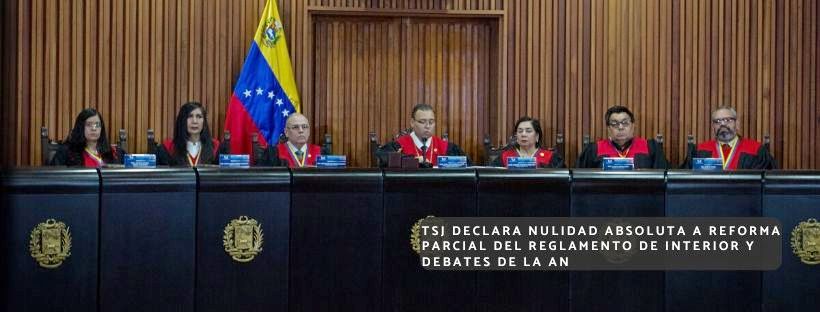
The National Assembly of Venezuela, in contempt of
laws it is duty-bound to uphold, amended regulations to allow fugitive
lawmakers living abroad to vote in parliamentary sessions via the
Internet.
Venezuela's Supreme Court of Justice (TSJ) Judge
Juan José Mendoza, who is the Constitutional Chamber
president, on December 19 ruled that lawmakers of the
National Assembly in contempt cannot cast their vote in parliamentary
debates if they are not present in the country.
"We declare the nullity of any modification that
the National Assembly in contempt has made to the norm that regulates
parliamentary debates," Judge Mendoza said.
The day before, Bolivarian lawmakers, who are part
of the "Homeland Block" that rejoined the National Assembly in
September, asked the TSJ to annul a modification of the debate law
which allows exiled or fugitive lawmakers living abroad to vote as if
they were physically present in Venezuela. In response to this request,
the Supreme Court judge indicated that, besides being unconstitutional,
such a modification is an absurdity without precedent in comparable law.
"There is no virtual parliament anywhere in the
world. All of them have physical headquarters," the judge said.
The Homeland Block also warned that this
modification is part of a strategy of opposition politicians, who seek
to boycott the 2020 parliamentary elections, to stay in power.
Currently, Venezuelan legal norms establish that
when the absence of lawmakers occurs, their respective substitutes must
assume their seats to participate in legislative actions.
In this context, the opposition-backed "Distance
Voting" proposal represents an obvious attempt to prevent lawmakers
from being replaced by their substitutes.
"The right-wing politicians seek to overthrow a
legitimate and constitutional government. We reject intentions of
violating the Constitution approved by the Venezuelan people," lawmaker
Julio Chavez said.
The amendment to the internal regulations of the
National Assembly in contempt was approved by the U.S.-backed lawmaker
Juan Guaidó.

Colombia
The crimes of Colombia's military during more
than half a century of armed conflict are being exposed with the
discovery mass graves in which unidentified bodies were dumped. The
latest was uncovered on December 14 in the municipality of Dabeiba in
the Las Mercedes de Dabeiba Catholic cemetery in the department of
Antioquia. The newspaper El País writes:
"There the Special Jurisdiction for Peace (JEP), the court born of the
agreements between the State and the FARC to investigate the most
serious crimes of the war, is searching for the bodies of at least 50
victims of extrajudicial executions perpetrated by the military between
2005 and 2007. The Institute of Legal Medicine and Forensic Science has
so far received information about 17 cases. But the dimension of the
drama of disappearances goes further. The country faces, according to
calculations of this public body, the exhumation of around 200,000
unidentified bodies."
Claudia García, director of the
forensic institute, pointed out that these are the staggering figures.
"In recent years we have surveyed all legal cemeteries, and -- let's
put it this way -- burials that are not legal in these clandestine
graves, and we believe that the challenge we are facing is looking for
the country's disappeared among more or less 200,000 bodies," she said
on Caracol Radio. "The challenge is very great and we will have work
for many years from the scientific point of view," she added, stressing
the importance of the government's involvement in carrying out that
task.
At present, the forensic institute is focusing on
the pit found in Dabeida, first by autopsying the exhumed bodies. The
team will then cross-check data with the information of relatives of
missing persons, to compare genetic profiles. "We will work without
interruption and by the third week of January we will have made the
first steps, rather than finishing the job because it is complex,"
Garcia said.
The report in El País
continues:
"Systematic disappearances still embody the most
vivid memory of the conflict and affect thousands of families. That is
why the work of institutions such as the JEP or the Search Unit is key
to trying to close the wound. Extrajudicial executions, wrongly called
false positives, only represent a percentage of those cases. As
highlighted by the head of the Institute for Legal Medicine, it will be
the investigations of the justice system that establish if they were
civilians assassinated by soldiers and then presented as guerrillas
killed in combat in exchange for awards and compensation. In the midst
of an amalgamation of estimates on the thousands of victims of this
procedure, official data offered by the Prosecutor's Office indicate
that between 1998 and 2014 there were more than 2,200 executions of
this type. The vast majority took place during the two terms of former
president Álvaro Uribe."
Further on the newspaper writes:
"The spectre of the crimes committed in the past
by the Armed Forces returned this year to shock Colombia and became
again, for the first time since the signing of the peace and the
beginning of the demobilization of the FARC, a central focus of the
political debate. The succession of complaints -- from a directive,
already withdrawn, that opened the door to a system of incentives to
improve statistics in the Army, the accusations against the commander
of the ground force, to the concealment of the death of minors in a
bombardment of dissidents of the former guerrillas -- cost Defence
Minister Guillermo Botero his job a month and a half ago. His
successor, former Foreign Minister Carlos Holmes Trujillo, has asked to
guarantee the protection of former military officers who cooperated
with the JEP and whose testimony was decisive in locating this mass
grave."
The newspaper quotes the JEP as saying that
"preliminary indications are that these were men between 15 and 56
years old, residing in Medellín, among whom would be found
people with disabilities." It concludes: "Since the proceedings began
last June, the judge has heard 160 testimonies from uniformed men who
voluntarily came forward to help clarify what happened. Thanks to their
stories, nearly 400 victims of extrajudicial executions have been
identified."

(To access articles
individually click on the black headline.)
PDF
PREVIOUS ISSUES | HOME
Website:
www.cpcml.ca Email: editor@cpcml.ca
|

